#no one has ever seen it outside of my grade 12 film class
Note
okay well. now that I know you also have an oc named Ash I would love to know more about them (it is indeed a cool af name)
OK so Ash is pretty high up there on my list of ocs that I adore (even if I haven't drawn her nearly as often as I ought to have) I don't want to reveal too many plot details/characterization due to a combination of spoilers and her still being in development, but....
She's from a cosmic horror story I started working on in high school that I'm still hoping to finish at some point! Ideally it'll be a webcomic, but that would also take a while, so who knows lol
Her backstory is vague and mysterious because she doesn't actually remember it. She remembers everything from up to a few years ago, but beyond that, everything starts to get fuzzy
She's a cool bisexual. She's a bad bitch. She comes in a package deal with the lamest guy ever (Jamison) do NOT separate them
No, like seriously. They can only be described as soulmates. They would die for each other. They can't live without each other. They're connected by something cosmic, and supernatural, and personal, and human, and beyond human, etc. They were made for each other. And it's great because Jamison is literally Just Some Guy.
They were also originally and slightly inspired by those two gay guys in the bathroom from Saw (2004), but not anymore though, they actually like each other now
In other words... Ash:
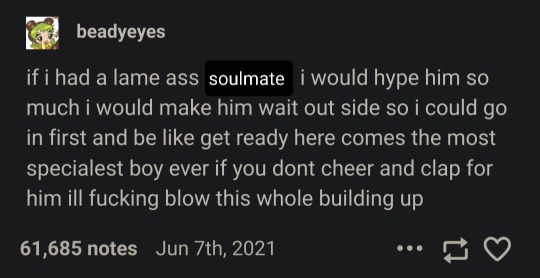
Also this (via catcrumb):
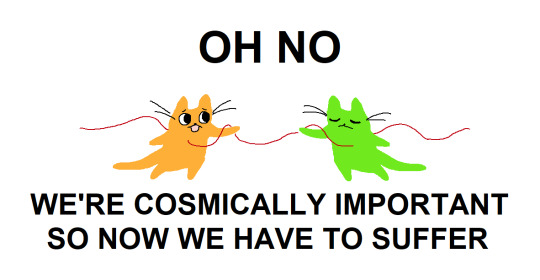
It's not even romantic. It's romantic-coded? I'm not even sure if I'd say queerplatonic. I never really describe whatever the fuck those two have going on in any specific terms in the story. I'm obsessed with m/f duos that are really close but not in a romantic relationship, because just saying "yeah they're in love, they're dating" is boring.
She's also kind of mean to him
She's kind of snarky and sarcastic, a bit of an asshole too. She's impulsive and has that "you only live once" type mentality. She's also charismatic, clever, and good with words
She plays by her own rules. She's rebellious and stubborn, and she HATES authority
Women are allowed to be little a scary. As a treat
Her and Jamison, along with a few other characters, are the only people who can see the [redacted] that are starting to breach into their world. Their task? Tracking down and finding anomalies and aberrations while they try to piece together the bigger picture of the potentially apocalyptic event that is happening in their city
She's pretty chill about it. Her main goal is to try and remember her past, and to make sense of the nightmares and the fuzzy, vague traumatic memories that ceaselessly haunt her
I don't really have any of good art of her, but I do have a few frames from the forbidden (OLD AS HELL) animatic short film she first originated from
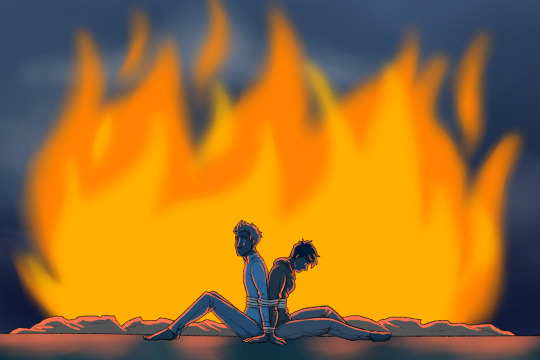
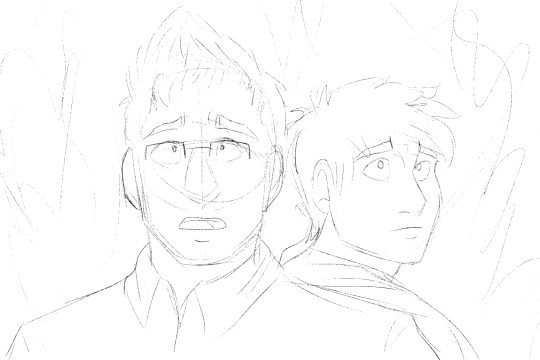
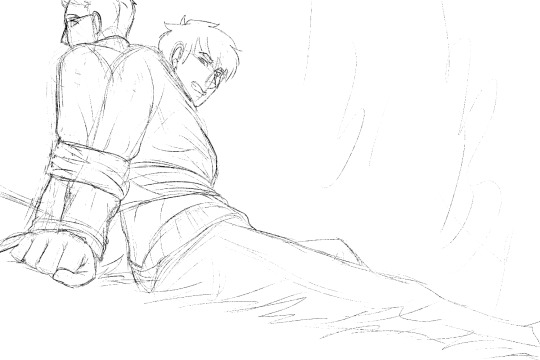
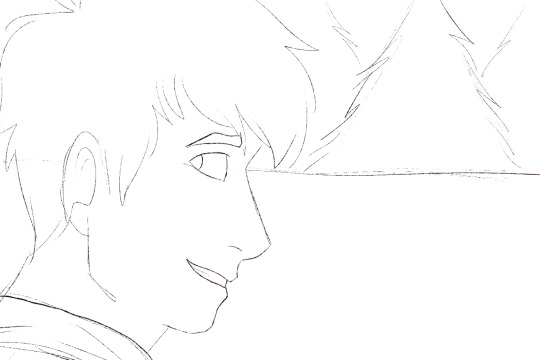
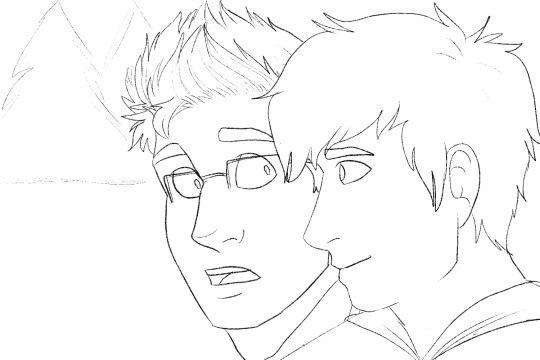
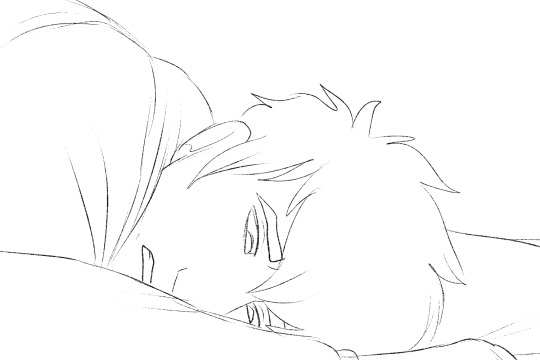
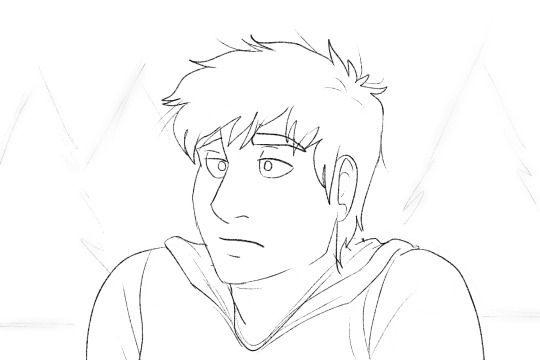
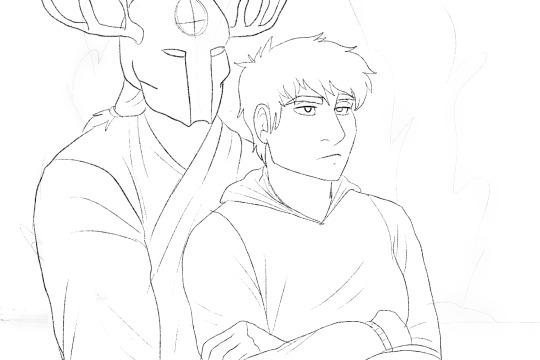
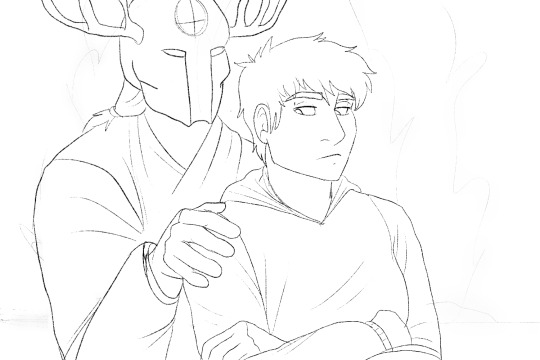
(Note that literally nothing from the plot of this short film is still canon to them, which is kind of awesome)
#thank u for the ask I'm so normal about her#oc tag#ash#gabeposting#I ''finished'' the short film? it was supposed to be all lined and coloured but I only ended up doing that for the first like 10 seconds#no one has ever seen it outside of my grade 12 film class#and my bestie who voiced her in it <3#anyways sorry this took so long to answer I couldn't find the drive I had these saved on
4 notes
·
View notes
Text
Actor Casey Affleck Reflects On The Past And 'The World To Come'
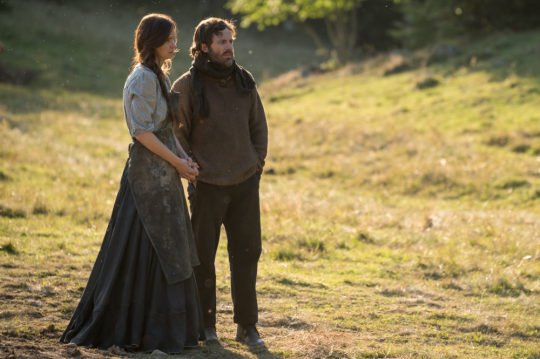
The last time I saw Casey Affleck was after an 8:30 a.m. Sundance Film Festival screening of “Manchester by the Sea,” which left my colleagues and I so emotionally drained we were pretty much useless for the rest of the day. Affleck finds this very funny. “Oh man, that’s awesome,” he laughs. “That was a tough screening. At Sundance I’m usually just going to sleep at 8 a.m.” We’re talking on the phone a few days after the festival’s virtual premiere of his latest movie, “The World to Come,” which made its Sundance debut last month under very different circumstances. “It’s so strange doing these things sitting in front of your computer,” he sighs.
Directed by Mona Fastvold, “The World to Come” is a powerful period piece about a forbidden love affair between pioneer women played by Katherine Waterston and Vanessa Kirby, set in upstate New York during the early months of 1856. Affleck produced the picture, in which he plays a supporting role as Waterston’s uncomprehending husband, and he did his best to soldier through a crowded Zoom Q&A after the Sundance screening, with results pleasant enough, but nonetheless missing that in-person festival magic. “I used to love going to film festivals and talking to journalists and seeing all the movies and talking to other filmmakers,” he laments. “Sitting here alone in a little office in my house is such a drag. But it was nice to know that the movie was getting seen, at least.”
While big brother Ben plays Batman in studio pictures, Casey has exhibited a restless independent streak ever since he was a student at Cambridge Rindge and Latin School. (Our ninth-grade classes competed against each other in the Mass. High School Drama Guild Competition. His won, perhaps unsurprisingly.) A longtime friend of the Brattle Theatre and former creative advisor for the Independent Film Festival Boston, the younger Affleck has always seemed more at home in indies. Not a lot of actors would follow an Oscar-winning role in “Manchester by the Sea” with a microbudget art film like “A Ghost Story.” But then his internalized, minimalist acting style is often at odds with the concerns of contemporary blockbusters. There’s a weird dissonance watching something like Disney’s hokey Chatham sea adventure “The Finest Hours,” with Affleck going full Montgomery Clift while surrounded by CGI silliness.
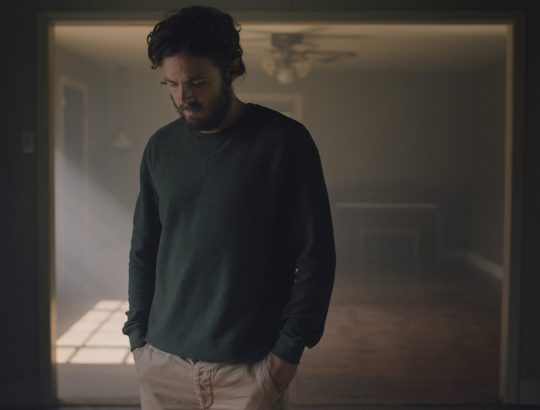
“The World to Come” is the most ambitious project yet from Affleck’s Sea Change Media, which partnered with Pamela Koffler and Christine Vachon’s legendary NYC indie institution Killer Films for the arduous production that began with a conversation between Affleck and novelist Ron Hansen nearly a decade ago. “When I did ‘The Assassination of Jesse James by the Coward Robert Ford’ I got to know Ron Hansen, just because I loved the book so much. Ron has a very unique talent for writing 19th century language. He’s just from another era. I asked him if he had something he wanted to work on together, and I thought he would send me one of his things. Instead, he sent me this story by Jim Shepard. It was beautiful. I said, why don’t you and Jim write the script? And they took about six years, but it came together beautifully. Good things come to those who wait, I guess.”
The film eventually shot in Romania with a break built into the schedule to accommodate the changing seasons that are so crucial to the movie’s rugged, outdoor textures. “We were way out in Transylvania, out in the mountains,” Affleck explains. “We were just in some valley and they built a couple of farmhouses. I like being far away in a new place. It makes you feel outside of your life. And I love working in weather. There are so many aspects of moviemaking that are artificial, but when there’s extreme weather, it’s real. I did this Disney movie about a boat rescue, and it was, like, December in friggin’ Quincy and they were just soaking us with water every single take. There’s not a lot that you have to quote-unquote act. You’re just standing there, teeth-chattering, shivering, just being.” This reminds me of the scene in “Manchester” when he and Lucas Hedges have an argument walking in the blistering cold and can’t remember where they parked. “I forgot about that one,” he laughs.
I’d never say so on the phone, but I consider Affleck’s performance as Lee Chandler in “Manchester by the Sea” among the finest I’ve seen in my 22 years of reviewing films, worthy of discussion alongside Brando’s Terry Malloy in “On the Waterfront” in its aching, inchoate longing. Lee holds his grief somewhere very private and dear, as if to begin to forgive himself would be an act of betrayal. The movie nails a gruff, emotional constipation popular among men of a certain stripe, especially in New England. (My mother offered my favorite review of the film: “Why don’t they just talk to each other? Jesus, this is like watching you and your father.”) Words don’t come easily to most of Affleck’s movie characters, but he chafes at the description of them as inarticulate. “It’s funny, I find the characters in ‘Manchester’ to be sometimes very articulate,” he argues. “There’s misunderstandings, but they end up communicating what’s inside.”
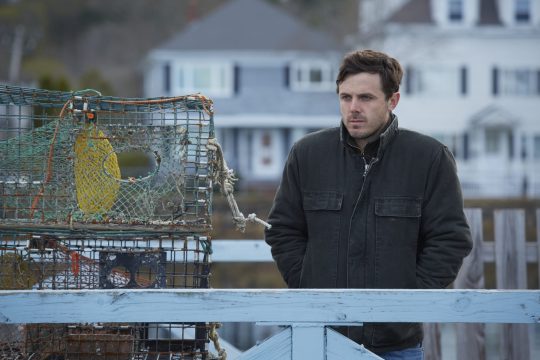
“The World to Come” is rife with such mixed signals and miscommunications, about which co-star Katherine Waterston raved during the Zoom Q&A after the Sundance screening. “It was so much fun to play the scenes with Casey,” she said. “A lot of these scenes are written as dances, where somebody tries to reach out and engage and they’re misunderstood. Inarticulacy is a very interesting thing to see in film. The failed attempts. Failed communications. It’s actually fun to play those things. You don’t know what the other person’s going to throw at you. It keeps it really alive on set. Mona and I felt if we had the money we could have kept shooting this thing for months, because the scenes were so much fun to explore.”
Affleck agrees. “When Katherine’s character writes in her journal or she starts talking to Vanessa, they have this beautiful, expressive way of speaking to each other,” he enthuses, whereas his character “says what he’s gotta say in as few words as possible. He’s very brusque and curt, which I enjoyed. The way that he talks is the communication equivalent when he gives her a birthday gift of sardines and a tin of raisins.”
Indeed, her increasingly florid diary entries — originally intended as a ledger to keep track of the farm’s monthly expenses — become the heartbeat of the film, providing an emotional release otherwise suppressed by the rigid formality of the era and the ugly drudgery of day-to-day farm life. “The World to Come” is ultimately a movie about the need to share our stories, and how through telling them we make sense of ourselves. As producer Koffler explains in the press notes, “Part of the film’s vision is to dramatize a very basic human impulse: to create, to connect, to say ‘I was here, and I mattered.’”
This has become a recurring theme in Affleck’s recent work. In 2019, he wrote, directed and starred in “Light of My Life,” a little-seen but strikingly tense post-apocalyptic road movie about a father and daughter hiding out in the wilderness after a pandemic has wiped out most of the women in the world. The film begins with Affleck telling the little girl a bedtime story that runs almost 13 minutes and sneakily sets up the movie’s major themes. Then in last month’s well-acted but regrettably soggy “Our Friend,” he starred as real-life journalist Matthew Teague, whose soul-baring Esquire story about his wife’s struggle with cancer became a national phenomenon.
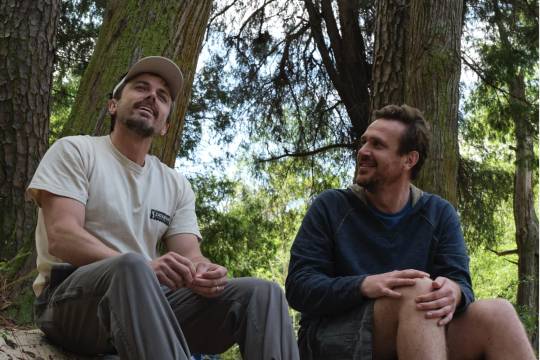
“Matt Teague wrote that article and then wanted it made into a movie as his way of processing everything that had happened,” the actor elaborates. “You transform pain into other things as you go through life. That was all him working through it. I like stories about storytellers and I like stories within stories. Obviously, I wrote and directed a movie that starts with a 12-minute bedtime story. I love that. I know that other people don’t love it as much as I do, so I have to be careful about it.”
That kind of love led to last summer’s “Stories From Tomorrow,” a project initiated during lockdown by Affleck and his schoolteacher mom Christine, encouraging children to send in poems and short stories to be read on social media by celebrities like Matt Damon and Jon Hamm, as well as his “The World to Come” co-stars Waterston and Kirby. “That was something I started out at the very beginning of the quarantine as a small project to encourage kids to write creatively, because I know it can be a great way of processing anxiety and working through feelings that you aren’t really talking about or aren’t aware that you’re having. It wasn’t something I thought would go on forever; once the kids are back in school that ought to be where they should be doing all that kind of work. But while they were sitting at home, I thought it would be a good way to get their attention off the awful news and into something more imaginative. And I also got a chance to read all these super-cool stories! Really creative stuff that kids sent from all around the world.”
Finally, as a Boston publication it would be dereliction of duty not to mention the hysterical Dunkin Donuts commercial parody from when Affleck hosted “Saturday Night Live” in 2016, so dead-on in its depiction of a local 'regulah customah' that on one of my critics’ poll ballots that year I tried to nominate the sketch for Best Documentary. Alas, the performer shoots down a pet theory I’ve been hanging onto ever since, that the dirtbag Boston guy in the Bruins hat is secretly a grown-up version of Affleck’s scene stealing, bug-swallowing Morgan from “Good Will Hunting.”
“I hadn’t thought about that, dude. That’s really funny. It never crossed my mind." He pauses before confiding, "I wasn’t that great on SNL… I just wasn’t all that funny on the skits, because it’s live and you’re reading the cue cards and it was my first time. But when we went to make that little pre-recorded short film of the Dunkin’ Donuts ad, I really felt like that was my wheelhouse there. I could’ve played that character in a movie. I could have gone to work and played him every single day, and I would have had a blast. That was really fun to do. I would love to do another one of those. That would be funny to see that character again.”
I bet that guy’s got some stories.
“The World To Come” is now in theaters and will be available via video on demand Tuesday, March 2.
[source]
3 notes
·
View notes
Text
From a very young age it was reinforced that my ADHD was a disability I was meant to overcome rather than a tool I could use to better myself. I didn’t even know that I had been diagnosed, and that my mother had chosen not to medicate me, until I was partway through highschool. By that point I had already begun to give up on ever truly “making it” in life. The hurdles I needed to overcome had demoralized me to the point of near total apathy. Between my sexuality and early coming out in a small town highschool, and my various mental health problems, I felt like no one in the world saw things from my point of view. The last blow to my self esteem came when my grade 12 english teacher, the true decider of fate to any young person, told me my final thesis on Lady Macbeth being one of the greatest example of the flaws in Machiavelli’s “The Prince” was brilliant, but due to formatting and scattered grammar issues, she could give me no higher than a 60%. After years of getting consistent high 90’s in my english classes as well as other subjects, I had failed this extremely crucial essay due to the idiosyncrasies of the most frustrating language known to humankind. I passed that class with a 68, and felt like my fate was sealed. No chance at getting into any University in the country without redoing 5 months of work because one person believed that following the rules was a more important indication of intelligence than original ideas and the ability to make an argument. It crushed me. I admit that I didn’t put in the effort, but I had spent my entire life being told I was incredibly intelligent. It was the one thing I held onto. I felt betrayed by the education system. Though it was also due to many other factors at the time, this contributed to the second of my four suicide attempts. Today, I reject that philosophy.
When a person with ADHD is thinking, they connect ideas in their heads much faster than the average person. It can be confusing and disorienting to the people around them. I constantly have to explain how I got from point A to point B because the points connect automatically in my head. It’s exhausting, so I frequently do not bother to try. It’s extremely helpful when crafting an argument, however it can be debilitating in many aspects of modern life. Things the average person doesn’t think about, can be crippling for me. Without a true passion towards something, my ability to focus becomes hazy and my thoughts become scattered. I spend the majority of the day stuck in my head having conversations with myself instead of doing “normal” things with my time. I have spent my life being told that ADHD is my weakness, today I can tell you with the utmost certainty that it is my greatest strength.
When the international pandemic of the respiratory disease “Covid-19” truly began and the world went into full nationwide lockdown, the bistro that I had, for the most part, happily been employed at shut down. After 8 years of honing my culinary craft certain that my skills, though undervalued, would always be needed somewhere, I was out of a job. Indefinitely. So was most of the country that worked with their hands or, in some capacity, physically with other people. Unless you were able to conduct business through zoom conferences or were a suddenly “essential” employee like a fast food worker, you were left with little to do but sit and think or try desperately to distract yourself from the increasingly troubling world around you. Luckily, to my surprise, the conservative government had pledged to keep us all fed and watered as best they could. What deeply worried me was the knowledge that my friends south of the border, through no fault of their own, and already mostly furious with their government, were not being treated with the same bare minimum of respect. I knew it was a recipe for true disaster and widespread civil unrest as early as march.
I watched while the culture of social media, at least from my own lgbt bias, slowly started to shift and I picked up a lot of the big picture through memes and personally shared anecdotes. Celebrities were being ripped apart as they tried to get our attention again from their huge mansions while people sat at home worried about how to feed their children. Using insensitive phrasing like “we’re all in this together” when they undeniably weren’t. It quickly became a social caste system. The desperately poor trying to creatively make money any way they could. The often needlessly endangered. And the upper class for whom, little had changed besides the inability to do whatever they want at any given time. The lines were very clearly drawn. While the rich bemoaned their accessibility to haircuts, the poor argued with landlords about rent. All the while another group was frequently paid minimum wage to work on the proverbial front lines; flipping hamburgers, being yelled at by the rich because you were out of everything with the supply chain so damaged, or literally saving peoples lives. The anger and frustration quickly took over nearly every form of social media. Subtly, but day by day it grew. There was only so much one could do from inside their apartments, and globally, the havenots found solace and comfort with one another. The narratives of meme culture, which had matured and specialized far beyond the early days of “lolcats” and “trollface” comics, became almost exclusively about mocking the rich and their inability to deal with slight inconveniences.
Nearly every month of 2020 was a new major nationwide crisis and people had little else to do but talk about it or ignore it. The year kicked off with serious threat of a third world war because Donald Trump was tweeting intentionally inflammatory remarks towards the fascist leader of North Korea. All while nearly the entire country of Australia was ravaged by forest/bush fire. January saw a clearly corrupt president unbelievably not be impeached. Sparking outrage among, in my humble opinion, any sane individual. This also exposed, to anyone who knew all the facts, that the systems to hold those in power accountable was clearly broken and corruptible. Towards the end of January, beloved basketball player Kobe Bryant died in a horrible helicopter accident involving his daughter. Late February leading into early March was when global fears over Coronavirus began to be taken extremely seriously by every government in the world, the exception being the United States and the Trump administration. By late April, the country had over a hundred thousand dead, and nearly a quarter of its population out of a job. The irony of this, is that the calls to reopen the country didn’t come from those that had lost their jobs, but the upper class that had grown restless deprived from their usual comforts. Meanwhile we openly mocked them on instagram, tumblr, and twitter. Trying desperately to make light of a horrible situation and bring at least a little levity to their lives. News that a new breed of dangerously fatal hornets had migrated to North America was derided as a filler episode. One of my personal favourite takes on the year as a whole so far was a comparison to the four horseman of the apocalypse. January representing War, February representing Pestilence, March representing Famine, and April representing Death. In fact a lot of meme culture started to take on an extremely apocalyptic vibe. The message for many was clear, and depressing.
Then things started to happen really fast, so fast that for many it would make your head spin looking at it from the outside. It began with a video featuring a white Canadian woman from Waterloo named Amy Cooper that went viral across the globe. In the Ramble area of Central Park in NYC, this woman was filmed by a clearly peaceful, yet insistent, black man named Christian Cooper, no relation, asking her to leash her dog. This is a bylaw of the area. The woman refused and began to become very distressed, roughly handling her dog by the collar. She started dailing 911 and accused the man of assaulting her to the dispatcher. What many understood about this act, and rightfully called her out in outrage over, is that she was using her knowledge of how police handle black people in America to threaten this mans life over leashing her dog. She has been fired, and the shelter has taken her dog back.
Two days later, as I was travelling to my family’s cottage to “get away from it all and unplug”, a friend sent me a snapchat video from Minneapolis. It was on fire. I immediately did everything I could to try to find out what had happened. That, is when I saw the video of 8 minutes and 46 seconds of a police officer with his knee on the neck of another human being. This did not shock, nor suprise me. I had followed the many accounts of police killing people on video since 2014 when I was 16. When the Ferguson protests over Michael Brown’s killing by police officers were broadcast over most of the developed world. I had seen little change, despite Barrack Obama being President. This continued to happen for the next 6 years, though there were no more protests. Some of the people of those original protests that started the Black Lives Matter Movement, went missing over the next several years. Mainly those that had been photographed.
George Floyd’s death, I feel, was the straw that broke the camels’ back. Which is how anyone who has personally experienced police mistreatment and injustice would understand watching that video. A societal contract had been broken. And Minneapolis started to burn down the city that would let this happen to their friend, their neighbour, their father, their brother, and most importantly, their son. The words that chilled me to my very core… And continue to make me cry when I think about. Continue to make me want to punch every cop I run into.The words that have caused me to continue having this argument every day with everyone I know. The words that make me want to scream and rage and burn that country to the ground…. “Mama”
In his dying breaths this man called out to his mother. Who had died 2 years earlier. Who could not come save him. The police officer casually, with his hands in his pockets, knowing he could get away with it, murdered that man while he called out for his dead mother. Suffocated him to death in the middle of a global pandemic driven by respiratory disease. If I had been in Minneapolis that night, I would have helped burn it to the ground.
Something I didn’t expect happened then. Something I didn’t expect when I saw the fires and the rage from mostly black citizens of the city. As I watched Fox News try to turn the story into a conversation about rioting and looting rather than Police accountability. Other peaceful protests started up in other cities. My entire social media feed from multiple sources was filled with people discussing their anger and vowing to protest it. I don’t like to admit that I didn’t see this coming. But on May 26th, as I ravenously tried to keep up from the comfort of a cottage on Crystal Lake Ontario, a spark of hope for humanity that I had lost a long time ago started to ignite.
Something interesting happens when you get most of your information from social media. It either makes you hyper critical of everything you’re told and willing to research anything important, or it makes you willing to believe anything your friends tell you. As the protests kicked off in major cities across America, after months of inactivity, my ADHD kicked into high gear. I used every neuron of my brain power to follow the protests from as many different angles as I could. Most importantly, I followed the story from the people who were at them. That’s what growing up in modern society makes you do. After months if not years if not decades of being lied to for personal gain constantly. It makes you pay attention to the people who have nothing to gain.
I got back to my appartment from my cottage a day later, still glued to my phone. Barely talking, barely eating, barely sleeping. I watched police officers in riot gear throw tear gas into peaceful protests in every city in America. Tear gas, by the way, is an international war crime in combat situations. I watched media with an implicitly right wing bias condemn the protests. Convincing people that looting was worth a war crime. I watched it work. It worked with my own father. It did not work for me. I watched the news from political biases of both sides but took most of it with a grain of salt. That’s what I had been taught to do from as young as 14 by the world I grew up in. The news could give me general information. However, the story was on the ground and I knew from experience that people would try to bury it so I had to watch it as quickly as possible. I watched friends of mine in the states get tear gassed and beaten while exercising their first amendment rights. I watched the news condemn the protests. I was horrified. I watched the peaceful protesters of police brutality in New York get beaten and gassed from a minimum of 30 different perspectives of the people I knew and trusted, and those I didn’t. I watched the peaceful protestors in LA get beaten and gassed from the same amount of perspectives. I watched them throw flash bombs and shoot rubber coated bullets into the faces of my friends in every city in America. I watched the President of the United States order the peaceful protestors in front of the White House to be beaten and gassed so he could have an awkward photo-op with a fucking bible. I watched this for a week straight from every angle available. Day in and day out. Every hour I was conscious, I watched fascism try to grab power in in every city in America. I watched people in powerful positions deny it.
It wasn’t just paying attention to the protests and the news of them explicitly. I wasn’t just filled with horror. I was also watching something wonderfully unexpected happen. I watched my black friends, my gay friends, my asain friends, and my intelligent friends, begin to weaponize social media. I watched them beg all of their friends to do the same. So did I, even though I felt like there wasn’t anything I could really do from cozy liberal Waterloo. I watched us all turn the algorithms against the people who made them. I did everything I could to make sure you couldn’t turn away. I told my gay white friends condemning the actions of protestors that his rights came from a riot. I watched them shrink in fear of my voice. My father told me I was getting caught up in left wing rhetoric. I tore his arguments to shreds. He told me broad angry statements don’t do anything. I told him broad angry statements create the conversation we’re having. Resistance is a highway with many lanes, and I knew my lane.
You grow up, especially in my age, especially when you’re gay, especially when you are exposed to a lifetime of stories of rebellion against tyranny, hearing about the power of resistance. As I marched in Waterloo with over thirty thousand people I didn’t know, I realized that I have never truly understood that power. How it surges through your body like electricity as you scream until your voice is hoarse. It’s a high better than any drug known to man, than any pride parade where I was pandered to by corporations for hours. It took my fear, and my anger, and my helplessness and turned it into raw power exploding from my body. I continued to watch people I knew deny reality.
The protests grew. They spread across the world like wildfire. I went to facebook, a place I avoid because I don’t agree with the majority of people on it, and told anyone who would listen to me that this is what Pride means. What it truly means to be proud of your community. Not a rainbow flag in a store window, not a corporation asking you to buy it’s rainbow backpack. But turning apathy in face of evil into raw unbridled electricity. I watched the protests spread to Montreal and Toronto, I watched the police mishandle things there too. I watched violence perpetuated by the state against my friends, people I’ve known for years. The power I felt merely grew. It grew with every flash grenade and bullet and tear gas canister shot at my friends. It will not subside till this is over or until I die. I’m going to spend the next decade giving up the comfortable life of good food, great drinks, and fantastic company that I found in the restaurant industry. I’m going to spend a decade getting my Law degree to fight for every last one of us in the courtroom because that is a place I can make it count.
Today is June 8th of the year 2020 and I began writing this piece at Noon, it is now 4:11 P.M. I have done zero editing and I refuse to. I submit this as my revised final essay. I want to know when you got behind the protests. Because if it was as you were reading this, I deem you unworthy to judge my critical thinking skills. If it was yesterday I think you should be ashamed of yourself. I was with them from hour one. You should have been too. How dare you spend years teaching children about racism and oppression. How dare you tell me that I’m not worthy of higher education in any form. Telling children that wikipedia is unreliable as a source is idiotic, it’s one of the most peer reviewed encyclopedia’s to ever exist. How dare you tell me and the young adults you teach that you don’t give out scores higher than ninety percent. What is the point of forcing teenagers to write in cursive. Why must I live the experiences you write about in your precious properly formatted essays. In this country a 68 is two percent shy of getting into any University. It’s sentencing an intelligent person with an array of disabilities a life of believing they have no power. Despite my own mistakes at the time and the amount I have grown as a person since, I will hold you personally accountable for that.
As a closing statement, to every English teacher in this province, no, to every English teacher in the great country of Canada. Think very hard about when exactly you put your full support behind this movement. Because your curriculum is outdated, and absolutely useless in the real world. And your racism is showing.
Post Script.
There is no bibliography of unbiased sources because all sources are biased. You have a supercomputer in your pocket and this should all be public information. Look it up.
11 notes
·
View notes
Note
All 55 bitch 💖
1. If you didn’t have to sleep, what would you do with the extra time? sleep
2. What’s your favorite piece of clothing you’ve own/owned? I have this old jacket that is real big that's like from the 80s and I love it
3. answered!
4. What would your perfect room look like? pink honestly or very 80s
5. Do you play sports? with these hips? God WISHES
6. What fiction place would you love to go to? a sitcom honestly
7. What Job would you be terrible at? math
8. If you could turn any activity into an Olympic sport, what would it be? crying, I'd win
9. What’s the most annoy habit other people have? telling me to stop biting my nails
10. What skill would you like to master? acting
11. What would be the most amazing adventure to go on? going anywhere but utah
12. What’s your favorite drink? coke!!
13. What state or country would you never like to go back to? I've never really been outside utah
14. What songs do you have completely memorized? a lot of em honestly
15. Are you usually early or late? early i have anxiety
16. What takes up too much of your time? sleep
17. What do you wish you knew more about? c*******e but I kinda know everything by now
18. What are some small things that make your day better? talking to a boy and singing
19. What TV channel doesn’t exist but really should? i wanna watch professionally filmed musicals
20. Who has impressed you the most with what they’ve accomplished? me!!
21. What age do you wish you can permanently be? 25?? I dunno I'm only 19 right now and it bites
22. What TV show or movie do you refuse to watch? I dunno
23. What would be your ideal way to spend you weekend? just hanging out with I like
24. What’s something in your life that’s considered a luxury? calico critters
25. Is there anything you’re too young/old for? I'm too young to drink legally
26. What’s your favorite genre book or movie? anything!
27. How often do you people watch? a lot
28. What’s the best single day on the calendar? my birthday!! it sucks cause i get older but also it's a day for me!!
29. What are you interested in that most people haven’t heard of? they heard about it but c********e
30. Do you relax after a hard day? I probably cry
31. What’s the best book or series you’ve ever read? nerds and the girl that can fly
32. Where’s the farthest you’ve ever been from home? California but like..that's legit home too so i guess Colorado
33. What’s the most heart warming thing you’ve ever seen? my kids at the daycare saying they love me
34. What’s the most annoying question that people ask you? "so what grade are you in now?"
35. Would you give a 40 minute presentation with no preparation? NO
36. What’s something you think everyone should do at least once in their lives? be my friend
37. Would you rather go Hand Gliding or Whitewater rafting? neither I'm a baby bitch
38. Dream car? I can't drive
39. What’s something so many people are obsessed with and you just don’t understand why? k-p*p honestly like good for you!!
40. What are you most looking forward to in 10 years from now? I'll be 29 so like married
41. What’s something you’ve been meaning to try but haven’t gotten to it? i wanna audition for plays and musicals again
42. What’s the best thing that’s happened to you all week? talking to the boy i like!!
43. How different was your life one year ago? well I was taking only one college class and didn't have this brace so very dif
44. What/who would you rate 10/10? shrek the musical is 100/10
45. What kind of art do you enjoy the most? ladies being pretty and impressionists
46. What do you hope never changes? my kids at the daycare
47. What movie title best describes your life? dear dumb diary
48. What website do you visit most often? this hellsite
49. What’s something you’re looking forward to this year? moving without pain
50. What’s something you’d like to unlearn? math
51. Where would you spend all your time if you could? the ocean or like the lake
52. What age would you like to live to? 65!
53. What’s something you’re most likely to become famous for? ideally singing and acting
54. What’s something you’re most likely to be arrested for? arson
55. What’s something you really want but can’t afford? a few plane tickets and calico critters
1 note
·
View note
Photo

Two weeks ago I was on my way to work and my car died in the middle of the street. The oil indicator light and the draining battery indicator light came on at the same time and then the engine cut out. I pulled to the side of the road, got, help, and got a ride (thanks Mom and Dad) to work. That was the last time I would ever drive that car. My parents had been urging me to sell it, but I had been putting it off because I loved that car. Even though it was a humble-at-best, crummy-at-worst car, I loved the way it looked and the way it handled, and all the things I had done in it. It was on its last legs, but I thought I would at least have time to say goodbye to it, and that it wouldn’t kick the bucket for good suddenly and without any fanfare. The day after it died was July 4th, so all the auto shops were closed and I had to wait for a proper diagnosis. I wasn’t very optimistic, but I still secretly hoped that maybe, just maybe it could still be fixed without much expense.
I was right to not be optimistic. It wasn’t completely done for, but the repairs would cost $1500 or more, which was about as much as the car was when we bought it. The next thing I knew, my Dad had sold the car for $250 to a mechanic at the Toyota dealership who was interested in fixing it for himself. The last time I saw it was when I went to go clean it out and turn in the keys.
Little car, there was a lot going on with you.
I got you in 11th or 12th grade because I needed a replacement car. I had been driving a blue Ford Ranger which before that had been my sister’s, which before that had been my Dad’s. I loved that car too. I lost it, though, when I was hit by a drunk driver. One evening I was returning home from watching that week’s new episode of Lost at a friend’s house and I made a left turn on a green light. There was a white F-150 in the oncoming lane but I judged it to be a decent distance away. I committed to the turn and the next thing I knew there was a huge smash like a crystal chandelier being hit by a baseball bat, and I was pivoting. When I got out to inspect the damage the cab was fine, but the truck bed was crushed like a soda can and one of the wheels had come completely off. People who had seen the collision from the restaurant across the street said the other driver had accelerated when he saw me turning.
Your steering wheel made a strangely emotive moaning noise whenever you were turned. Whenever I would take someone new for a drive in the car, they would always notice that sound right away and it would make them laugh every time. It always made the car sound tired and distressed, which it probably was.
When we first bought you there was a strange interior smell present that was kind of like Fruit Loops or a strong floral shampoo. Later a peach was found deep under one of your seats, mummified from heat. It must have fallen out of a grocery bag of the previous owner. After we got rid of the peach, the strange smell (mostly) went away.
You had a dimple on the trunk hood from a quarter-sized chunk of hail from a summer storm when you were parked outside.
Your sunroof visor came off for no particular reason on our way to or from college, I forget which.
The spring mechanism for the gas tank door was broken, so my Dad fixed it with a binder clip.
The foldout cupholder in the backseat was permanently unfolded and eventually just fell off entirely.
The door upholstery on the passenger side door came loose after a while and got worse and worse every summer until eventually it just hung off limply. The tinting on your windows was peeling.
The check engine light was always on because of a problem with the gas tank seal, so I could never really tell when something was wrong with you.
The lid to your driver’s side sun shield fell off, so I could always see myself in my peripheral vision when I needed to use the sun visor.
There were some weird scratches and dents on your sides that I don’t know where they came from. Probably parking lot door mishaps.
Your front bumper was newer than the rest of you because we were in an accident. I was driving back to Oklahoma from Savannah and another driver merged directly into the left lane without looking, pushing me into the median. I went from pavement to grass at 75 miles an hour and lost control of the car in my attempt to get back on the highway. The car spun around across the highway and we ended up partially suspended over a creek by a barbed wire fence. The other vehicle never touched mine, but the front bumper and tires ate so much grass and mud in the process that it had to be completely replaced. Later I found out that the other driver had just been told over the phone that his wife had brain cancer, and he was rushing home to see her.
In college I changed my first tire. It was midterms, and I had to present my progress on my senior film. Normally I would have taken the bus to class, but I was running very late and took the car instead. The back left tire had been a little low on air, but I didn’t think it would be a big deal. I was scarcely out of the dormitory parking lot when I felt the tire shred and heard the screech of the axel on the pavement. I managed to park in a grocery store parking lot. I was already nervous about my soon-to-be lackluster presentation, so after I shredded the tire I was beside myself. I don’t remember what I did after that very well, but I guess I either caught the bus or called a friend to drive me to class. I got there an hour late and presented last. I was nowhere close to where I needed to be on my senior film, which barely had a coherent vision. I gave one of the worst presentations I have ever given and received one of the most brutally honest critiques I have ever been given. I just barely held myself together long enough to slink out of the building and into one of the community rooms of the next door dormitory, where I camped out in the dark and pitched an F5 panic attack. It was one of the worst days of my life.
Later that weekend, when things had calmed down and I had started to plan what I would do to clean up the mess I had made, I went back to where I had left the car and changed the tire. My friend Livali held the owner’s manual and read the instructions to me, and between the two of us we changed the tire without incident.
You had a problem which caused your battery to sometimes disconnect unexpectedly. The mechanic who helped me fix it said this particular model of Camry has short connector wires, whereas most cars of this size have connector wires with a little extra give to them.
There was a big scrape on your front right bumper because I was in a hurry to get somewhere and I pulled into a parking spot too fast.
Throughout it all, you had the worst suspension of basically any car, and it only got worse over time. I could feel the pavement through you like you can feel the ground through very thin socks. I didn’t mind, though. Possibly my occasional passengers did.
There was a lot wrong with you but you had a bangin’ stereo CD player and your AC could make the inside of the car go from 100 Fahrenheit to 75 in like 5 seconds flat. Bless you, little car. And good luck in your new life.
5 notes
·
View notes
Text
Oversharing Time!!!
(i just made that title up that’s not the official title I’m just Like That)
Ok so @frogyell tagged my main account (I am BLEST) but that’s for Refined Star Trek Content and this one’s for excellent moodboard content and garbage so here’s the garbage!!! I’m putting it under a cut bc it manipulates your brain to want to read through 85 fuckin facts about me more wow I love science
rules: answer these 85 statements about yourself, then tag 20 people.
1. last drink: Water! off to a great start
2. last phone call: my local Hot Topic. I feel like I should also mention I work there. But if you don’t know that and steal my phone you’ll see I have a contact named Hot Topic
3. last text message: Google sent me a verification code, but the last one I sent was to my brother it says “k”
4. last song you listened to: It’s called The Horror Of Your Love by Ludo, if I had to delete all but one song on my 121-song Best Enemies playlist I’d keep this one it’s Peak and kinda has vore but it’s metaphorical. metavoreical, if you will
5. time you cried: during my latest EMDR sesh! I was in Wales and everything it was a Lot I got ice cream after
6. dated someone twice? Big No
7. kissed someone and regretted it? Not really?
8. been cheated on? my ex had 16 anime dating sims downloaded at one point while we were dating does that count
9. lost someone special? yea
10. been depressed? hella
11. gotten drunk and thrown up? I’ve been drunk 1 time and it was when I was playing English handbells at my dad’s church’s wassail night but I did not throw up no
fave colors
12. Black
13. Lavendar
14. Light blue
in the last year have you…
15. made new friends? Hell Yell!!
16. fallen out of love? k i n d a ? ?
17. laughed until you cried? oh absolutely
18. found out someone was talking about you? OH BOY YUP YUP
19. met someone who changed you? yes! she managed to physically alter my hippocampus without touching it how fuckign whack is that
20. found out who your friends are? It’s always the same miraculous group chat
21. kissed someone on your facebook friends list? sure have
general
22. how many of your facebook friends do you know irl? I keep it nice and refined so all of them. My old account is another story
23. do you have any pets? one beautiful and talented cat named Moriarty. A good description is she’s got puppy software on cat hardware.
24. do you want to change your name? listen I’ve been through 4.5 of these fuckers, I like Nate, I’m Quite Finished
25. what did you do for your last birthday? invited 2 pals over, I remember one of them suddenly whipped out I Am The Doctor and the Dr Who theme on the piano out of fuckin nowhere and I was like “Daniel what the hell you’re so talented” and then I hardcore dissociated the rest of the day
26. what time did you wake up today? 10:00
27. what were you doing at midnight last night? chatting w @houseofoakdown and also editing my monstrosity of a fanfiction
28. what is something you cant wait for? Going back to school! then I can graduate in my pajamas and eat creamed corn in celebration
30. what are you listening to right now? the same goddamn playlist, this one’s called Battle Cry by The Family Crest, i cri erytiem
31. have you ever talked to a person named tom? probably???
32. something thats getting on your nerves? my brother vaping in the bathroom with the fan on at 12:30am
33. most visited website: tungle dot hell
34. hair color: I started out blonde af now I’m less blonde but still blonde.
35. long or short hair: short
36. do you have a crush on someone: :[] yes
37. what do you like about yourself: i’m hella smart, my moodboards are bangin, my writing is cool af, I’m well-hydrated at all times
38. want any piercings? Big No
39. blood type: A+!!!!! thats me!!!!!
40. nicknames: my brother calls me a goon sometimes
41. relationship status: im married to my laptop
42. zodiac: I was born on the last day of Taurus so I’m a definite Taurus/Gemini power combo
43. pronouns: they/them, tho in some places I use he/him bc The Dysphoria got hog wild enough I decided to pretend to be a trans guy so ppl would take me seriously, but I’m moving more towards they/them everywhere now.
44. fave tv shows: Dr Fuck, Sherlock (I’m armed with a pitchfork and an arsenal of beefed up tv & film knowledge come on fight me), DOWNTON ABBEY
45. tattoos: in August I will get a bee on my right arm and probably a Secret Word in Gallifreyan on my left it’ll say fuck
46. right or left handed: one time I was bored in grade 10 and tried to make myself ambidextrous but that was a hassle so I’m firmly right handed. Except in archery.
47. ever had surgery: got all 4 wisom teeth out not long ago! I still need to squirt water in my gum holes so I get all the mushy food out :{
48. piercings: I used to have my ears pierced but they’re grown tf over now!
49. sport: first of all what the hell is this question looking for second of all I have a red belt (which is 2 below black belt) in Taekwondo. I really need to do that again hhhhhh
50. vacation: i went to England and France in the summer with my family as a “””grad trip”””, it was lots of fun but my collection of sensory issues extended to chomping and I dissociated so intensely in The Louvre my mom told me to go back outside so I wrote fanfiction while listening to 21 Pilots and chatting w my imaginary friends and it took me like 18 hours to process I’d seen The Mona Lisa with mine own 2 eyes. Also the plane was delayed twice bc we used Air Canada for some godforsaken reason and I had 0 hours of sleep when I went to the Sherlock Holmes museum and I started talkin to this bust of Sherlock Holmes and then I hadn’t eaten enough and we were walking to this bookstore and I said “I need food!” and my dad said “We’ll get it AFTER” then I shouted “I’M GONNA DIE” so I got a BLT from Tesco.
51. trainers: h
more general
52. eating: the last thing I ate was chocolate chips straight out of the bag
53. drinking: I got another cup of water
54. im about to watch: my entire fanfiction to take 3000 notes on consistency. and by watch I mean read
55. waiting for: my brother (not vaping) to get out of the bathroom so I can PEE
56. want: Orphan Black to be on Netflix so I can actually binge watch it then call my grandma about it
57. get married: idk I didn’t think I was a get married person but since realizing I’m a lesbian it seems like a good idea!
58. career: nurse and a writer. I might just move to London and work double time to write enough scripts I have some street cred then pitch a TV adaptation of Faction Paradox to the BBC and win
which is better
59. hugs or kisses: hugs bc it means my friends are in my vicinity not Toronto
60. lips or eyes: uh. eyes???????????
61. shorter or taller: i’m 5′3″ and I would love a tol partner
62. older or younger: i don’t think I care
63. nice arms or stomach: what fresh hell does this mean. I’d like a nice stomach free of gastrointestinal issues and acid reflux. not that I have either of those but just in case
64. hookup or relationship: I have 300 many self-esteem issues so imma say relationship
65. troublemaker or hesitant: AU where I don’t have anxiety and I’m a trouble maker
have you ever
66. kissed a stranger: noop
67. drank hard liquor: I PUT RUM IN THE WASSAIL HELL YEAH also once someone bought me a shot at a queer dance thing bc it was payday and my friend told me to gulp the WHOLE SHOT and then the lemonade so I don’t barf and I was like “brah this is too high-stakes” so I poured the vodka in the lemonade and took sips and everyone stared at me
68. lost glasses: in grade 6 and then my mom threatened to make me wear one of those granny glasses chains so I never lost them again
69. turned someone down: ya this kid Cyrus used to chase me around in grade 5 and I’d run away always he was weird af one time he made out with a folder right in front of me in the middle of class
70. sex on first date: probs not at this point but I’m not opposed to the general idea when I’m less w h a c k e d u p
71. broken someones heart: Not that I know of?
72. had your heart broken: c o n s i s t e n t l y in the most fricked up ways god
73. been arrested: no but once I booed at the police bc the local nazis (yeah) were gonna have a rally so we had a counter-rally and I dropped in but there were no nazis except one old dude in a MAGA hat showed up 2 hours late lmao
74. cried when someone died: oui
75. fallen for a friend: Big Lesbian Mood
do you believe in
76. yourself: YA BB
77. miracles: not as such
78. love at first sight: nah
79. santa claus: I wasn’t allowed to believe in Santa as a child bc he was “too much like God” sad
80. kiss on a first date: ye!
81. angels: big no
other
82. best friend’s name: I don’t exactly have a proper best friend but I’m goin with Liam
83. eye colour: blue/grey
84. fave movie: either The Force Awakens (bc I love bb8 and I’m gay 4 Rey) or Interstellar shut up
85. fave actor: uh idk let’s go with my brother
WOW THAT WAS LONG JEE🅱️US. I’m tagging @houseofoakdown @spoonietimelordy @gemvictorfromtheponyverse @spockswhales @raesand and that exhausts the ppl I know but you’re all worth quadruple in my heart 💖
10 notes
·
View notes
Text
Top 6 Favorite Movies Of All Time
Hello friends! I am back this week with a new blog. This week I will be counting down my favorite movies of all time AKA movies that I’ve seen a million times and am still not sick of. I’ll talk a little bit about them and what makes them all so great. I shall start with number 6:
6. Disney Descendants 1&2 (2015 & 2017)

I feel like it should be obvious by now that I love Descendants with all my heart. For those who don’t know, the Descendants franchise focuses on the children of classic Disney characters. More specifically, the main characters are Mal, the daughter of Maleficent, Evie, the daughter of the Evil Queen, Jay, the son of Jafar, and Carlos, the son of Cruella De Vil. Both films center around the characters finding who they are as people outside of their parent’s shadows. They also happen to be musicals. Both of these films and the people in them mean a whole lot to me. Whenever I am not feeling well I can watch them or listen to the music from them and smile. The story line and the characters are so well written and complex, especially for a Disney movie. Although they are last on the list, that does not undermine how trash I am for this franchise. I don’t think I’ll ever get sick of either film or supporting Descendants as a franchise.
youtube
5. The Karate Kid (1984)
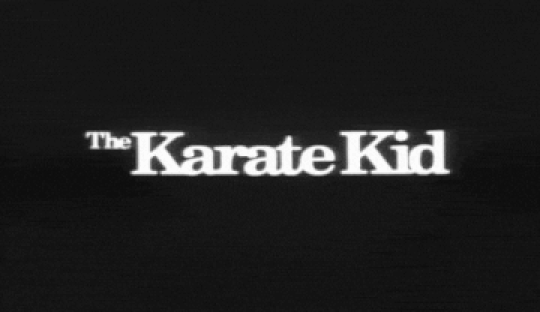
From this point on, I feel like it should be pretty obvious what my favorite movie era is. The Karate Kid was a pretty big success after its release. So much so that it earned two sequels, an attempted reboot with a female protagonist, a 2010 remake, and even a short lived cartoon series. I love the two sequels, but the original is my favorite which is why it earns its place as my fifth favorite movie of all time. I was introduced to the movies when I was very young and fell in love with them. The original specifically caught my attention because of all of the jokes my dad connected with. I also personally connected a lot with Daniel’s character and how much he grew throughout the film. As I watched it many more times, the jokes caught on with me too. I’ve never gotten less excited to watch The Karate Kid trilogy, and I don’t imagine I ever will.
4. School Of Rock (2003)

This is the stand out 2000s film among my top 5. I was first shown scenes from this movie in my fifth grade music class. It was one of my teacher’s favorite movies at the time, and he thought we could benefit from seeing the musical scenes, but purposely kept us from seeing the rest of the movie because of the adult language. He also claimed that people told him that he looks like Jack Black (to be honest, I didn’t see it). I remember that music class to this day, because without it, I may have never found this masterpiece of a film, or at least not as early as I did. I asked my dad to get me the DVD by telling him that I had watched it in class which automatically made him believe that it was appropriate for me to be watching. Of course, I didn’t gain as big an appreciation for the humor until I was a bit older. Still though, the story and music has stuck with me this long to the point that I can still watch it and get the same joy that I did when I first watched it as a rebellious 10 year old. School of Rock has given me such an appreciation for rock music and the community surrounding it. It’s such an important film, that I feel like everyone should see at least once.
youtube
3. The Goonies (1985)

Because do you really have a list of movies without at least one of them having something to do with Steven Spielberg? Of course not. This movie is about as “classic coming of age film” as it gets. I don’t have a complex backstory as to how I began loving this movie besides the fact that Corey Feldman is in it. It just kinda happened. It’s the kind of movie that gets slight chuckles mostly, but warms your heart nonetheless. I love this movie with all my heart. The Goonies is the one movie aside from The Nightmare Before Christmas that my family automatically associates with me. Any time it is on TV, they tell me or put it on if I’m in the room. I couldn’t ask for a better movie to be associated with. A true classic that deserves its spot in the film history books and in the third spot on this list.
youtube
2. Stand By Me (1986)

Another coming of age film with Corey Feldman that I love. Are you sensing the theme? I stumbled upon this movie while channel surfing and stopping when I saw Corey Feldman. I watched a bit of it and enjoyed it before I realized it was nearly halfway over and it wouldn’t make sense to watch it from that point. That’s why I asked my dad to get it for me, and he agreed. Funnily enough, Stand By Me has even more adult jokes than School Of Rock, and my dad was immediately yelled at by my step mom when she realized he had let me watch it. Still, I watched it and fell in love with it. It was my first and most impactful experience with Stephen King’s work. There are just so many iconic, humorous and beautiful lines in the movie that make it so easy to come back to. There are few characters in film that I love more than Gordie, Chris, Teddy, and Vern, and I suspect that that will always be the case.
youtube
Before I move on to my number 1, here are some honorable mentions:
-The Sandlot (1993)
-The Nightmare Before Christmas (1993)
-The Outsiders (1983)
-Little Shop Of Horrors (1986)
-Titanic (1997)
And finally my number one favorite movie of all time is...
1. The Lost Boys (1987)
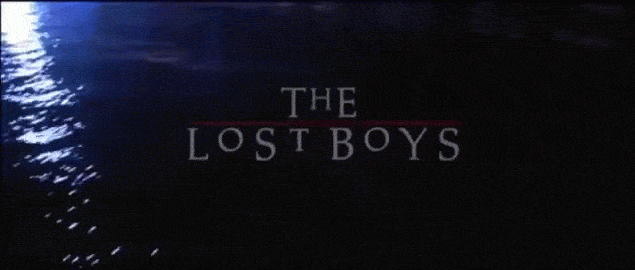
Yes, my all time favorite movie is the all around masterpiece of a film, The Lost Boys. It also had sequels, but unlike the Karate Kid sequels, we don’t talk about them. The Lost Boys was first introduced to me by my dad when I was 12. He told me it was one of his favorite movies growing up, so I was automatically speculating how could it could possibly be. Of course, 12 year old me automatically thought it would be lame. Little did I know that that day I would be introduced to a movie that would become my all time favorite (and Corey Feldman). It has remained as my number one favorite for all 8 of the years since then. I’ve seen it at least two hundred times in my life, and I’m still in love with it. At this point, I kind of just watch it to feel normal. I also bond over it a lot with my dad. The funny part is that as a more intense fan person than my dad, I know more about the movie than he does at this point. Still, whenever I am feeling reminiscent or feel like talking about vampires, my dad understands the love I have for this film. If I haven’t started hating this movie even after my 200th time watching it, I’d dare say I’m stuck with it.
youtube
Welp, that is it for this post, friends. If you also like any of my favorite movies or if you want to tell me about some of your own, feel free! I love geeking out about movies. Thank you for reading if you did. Until next week. 🤗
- 🕊️ ❤️ 🏹
#descendants#disney descendants#karate kid#the karate kid#school of rock#goonies#the goonies#stand by me#the lost boys#lost boys#the sandlot#the nightmare before christmas#the outsiders#little shop of horrors#titanic#movies#film#favorite movies#favorite films#favorite movie of all time#dovelikewar
11 notes
·
View notes
Note
omg I also refused to watch Lost for very similar reasons. I've also never seen any of the Star Wars films, so. I think i'm just a little outside of the zeitgeist, in a Not Cool way. Anyway you said you do meta and I was wondering: do you have any specific thoughts about the Jughead/Betty/Archie friendship when they were kids? I'm interested in your perspective on it. (All good if you have no specific thoughts about it though!) :)
sorry for a kind of delayed response! last couple days were busy.
anyway, hello darkness my old friend, i’ve come to ruminate on childhoods again
the way i see it, up until, say, about age 7-8, the Andrews did not live in the nice little nightmare on elm street neighborhood (legit this is canon; the coopers live on elm street, like), just as i don’t think the Jones lived in the trailer park all Jughead’s life
(also because he canonically had a treehouse at one point. things said in passing still count!!!!)
so let’s say around age 8, Archie Andrews and his family move in next door to the Coopers. Andrews Construction is doing better—not great, but better—and in order to appease Mary’s growing restlessness, Fred thinks if he can show his wife a good, comfortable life, she’ll stop mentioning Chicago so much. so he takes out a mortgage, even if the man at the bank had seemed a little too eager to give out loans like candy.
before that, however, the Andrews and the Jones live nearby one another. not quite southside, not quite north; not quite bad, not quite great, but equal.
Archie and Jughead are inseparable—in that Archie has an utter lack of boundaries and completely misses the dismissive social cues from a shy, quiet little boy who has never been good at making friends.
what starts as being thrown together in a very rudimentary and machismo concept of a preschool at a construction site becomes a genuine friendship, if not albeit one that still halfway requires proximity in order to function
and then the Andrews move, and FP is helping with boxes, and Jug is there to check out Archie’s new big bedroom in the big new house when he spots a little hand quickly disappearing behind a pink curtain across the way
he asks Archie then if they have neighbors and in a distracted voice, he says something to the effect of uh, yeah, i guess, but look at my tv, jug!
they come downstairs and FP is looking around with his lips pressed together, a sense of wariness that Jughead will not know how to place at age 8 but will learn to not much later
(here is where my headcanon gets syrupy: the Jones were also a founding family. they ran a glass blowing factory that made the maple syrup jugs for the Blossoms—until Forsythe the First picked a fight with old man flower dick and got blacklisted and lost everything)
(FP Jones, once the official Big Man On Campus, the boy with the sleek black camaro and money to spare, quickly learns what his life is worth) (his father turns to the drink and bitterness is a sweet fruit upon first bite)
(but hence, the name JUGhead, because life is a cruel joke)
the doorbell rings like the bell tower at high noon and Why It’s The Coopers! in all of their beautiful blonde glory carrying brownies. there’s the awkward shuffling of pairing up age groups and Jughead recognizes the little hand at the window as belonging to the girl who sits at the front of his classes.
he should’ve known that hand anywhere, because it’s constantly in the air in front of him, stretched high over her head as she answers question after question.
and at first—that’s it.
but then after a couple of weeks, he comes over to the Andrews’ new house and Betty Cooper is there, sitting in his usual spot on the black beanbag, and he has never been such a sucker to believe in cooties, but how dare she?
more importantly, how dare Archie let her?
Archie is the only friend he’s got, and he knows from a growingly keener eye on Betty that she has got plenty of friends and she can’t have his
this wariness and increasing surliness as childhood veers closer and closer towards adolescence, bringing with it realities that he Is Too Young To Understand, Jughead, But Your Father Knows What He’s Doing, but he still thinks he’s starting to
and then the summer of pee-wee football arrives. they’re 11 going on 12, and suddenly Archie can’t hang out in the weeklong intervals Jughead has become accustomed to. when he shows up on his bicycle at the Andrews only to be reminded of this, he starts to turn away, when he hears a little voice calling to him from over the fence
it’s Betty Cooper, and she wants to know if he wants to go for a bike ride because oh my god, she just got a new one and she’s sooo excited to ride it and Look At The Tassels!!!Jughead! and he’s about to say um no way and how old are you that you still want tassels on your bike when that rattling mouth of hers offers him sandwiches and chips and lemonade and all that’s in his house right now is instant oatmeal so fine, Betty, Fine
they ride down to the river and end up talking about their favorite movies and books—and jesus, she really likes The Mists of Avalon, but besides that, she actually has decent taste and they vow to make Archie suffer through a classics night
(and Archie absolutely hates Casablanca, the ending bothers him so much, and won’t hear the defenses from Betty and Jughead)
(but then they make him watch it again when Betty’s friend Kevin finds out she watched his favorite movie without him and it starts all over again)
that year, Jughead finds himself almost thinking that sometimes he likes spending time with Betty more than Archie, but he’ll never let himself admit it. he’s a purist, and Archie was there first. Archie is his best friend, even if lately all he wants to do is talk about girls and pee-wee sports
there’s a touch of irony when Jughead thinks about the fact that Betty is technically a girl too and he might think about her as much as Archie talks about Valerie and Cheryl and Josie and—
Jughead doesn’t dwell on it. he doesn’t.
and then they’re 13, and things really start to change. he’s shooting up faster than they can afford new pants, and so is Archie, minus the financial obstacles. Betty too. her hair seems brighter, her skin seems softer, and she finds an affinity for lip gloss
(Archie is the only one who doesn’t seem to notice, because by golly she’s good ol Betts! and pass the pizza, dude)
(Jughead thinks it doesn’t seem to bother her so much as it makes her transformation into a teenage girl all the more willful)
(—he also knows that her home life is stressful, and in a different way, just as stressful as his own—even if he can’t think about it too hard without needing deep breaths—)
Betty admits to him one afternoon by the river that her mom wants her to be so perfect and she doesn’t know what that means anymore.
but then he sees her figure it out—perfect grades, perfect dress, perfect smile.
perfect boyfriend.
people in their grades are starting to pair up and it’s freaking Jughead the fuck (*hell, sorry, he’s still 13) out, but nothing freaks him out as much as the fact that Betty is acting so weird around Archie now
he thinks what bothers him most is the way he can feel time pressing in on like a brick meeting mortar. things are changing and he hates it and he just wants to be watching movies in Betty’s basement and throwing popcorn at the tv with his friends, not watching her frown every time Archie watches a girl walk by
but what can he do? he’s not the perfect boyfriend. he’s not the one on the football track. he’s not all-american anything, unless you count trailer trash, because, well, that’s where he lives now
(as the narrator here, i must insert that what jughead is feeling at this juncture is less a crush and more the wistful nostalgia for the one he could’ve had)
(if only he had been born into a different family, he thinks to himself one night)
and that’s where he pulls back, because he’s getting a little sick of constantly thinking about paradigm shifts (a term he now understands and has rocked his world view) (ouroboros will be next)
he dodges texts, he briefly entertains lunches at the AV club room until the school cuts the program because We’re Sorry Mr. Jones, but One Student Does Not a Club Make, until Betty swoops in like his goddamn white knight and insists she is in the club and now they can’t cancel it!
and his attempts at pulling away are briefly loped off.
until high school.
freshman year is every thought he’s ever thought multiplied by ten, including all the ones about Betty Cooper.
as the narrator, i again interrupt to remind the reader that this is not so much pining as it is defensive frustration—Archie keeps getting Perfecter, Betty is getting Perfecter, and they are going to be Perfecter together and they’ll realize that Jughead is not part of the picture they want to be painting and soon he’ll be avoided and next year, Archie will probably be shoving him into lockers like Reggie Mantle
and that’s why, when the summer before sophomore year rolls around, and Betty is going to Los Angeles for her internship and Archie starts acting cagey, he accepts this as the inevitable, and bows out, thankful for the time he did have
but that’s the summer that everything changes
#bughead#riverdale#betty cooper#jughead jones#archie andrews#meta#i told you this would be a lot#relax sarah!!!#headcanon#fics#kind of#this is not really a oneshot but it could be#crawledoutofthesea
64 notes
·
View notes
Text
THE FUTURE IS BRIGHT: a *super* unoriginal ‘best films of 2017′ list
In life, we’re constantly asked what we learnt from things. It’s one way of measuring a completely immeasurable experience. Most films are built on this- ’character arcs’- how do they change and grow? What do they learn? (That’s not a negative thing, just the mechanics of this stick out when it’s done badly). With that in mind, I asked myself, from everything I watched this year, what did I learn?
THE BEST 12 ‘FILMS’ of 2017:
The first thing I learnt- films and TV series have become indistinguishable. It didn’t happen solely this year, but 2017 is definitely the ‘flag in the road’ point. Films are increasingly designed so they can be watched on a small screen with headphones, and most TV should really be watched on a big screen with proper speakers. And TV is sort of the wrong word. Netflix isn’t TV. I don’t know what it is. Just Long Form Storytelling perhaps? It’s certainly becoming less and less episodic. More and more feel like 10 hour films split into 10 parts so you can digest it better. So, this list is really the best 12 *things* of 2017.
The second thing I learnt- how you watch something is almost as important as what you’re watching. What headspace you were in, what time of day it was, if the room was totally dark, if someone a few rows in front of you was talking through the movie, if you’d seen the previous instalments in the series, hell- even if you’d seen the trailer. It all adds to how you think about the film. So, on the list, I’ve included where I saw it.
12. THE DISASTER ARTIST (directed by James Franco)
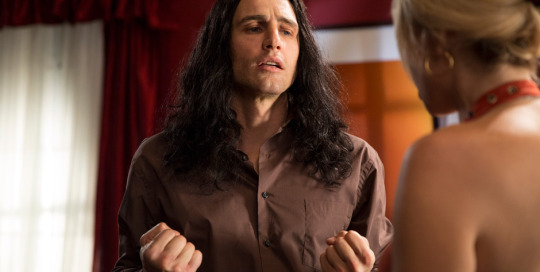
True story about the making of Tommy Wiseau’s The Room, the best worst film ever made.
I cried like I haven’t cried in years watching this. I don’t know what it was. Just something about the last act hit me so hard I couldn’t contain myself. And when you’re trying to contain yourself BECAUSE THIS IS NOT A SAD FILM AND YOU SHOULD NOT BE CRYING EVERYONE ELSE AROUND YOU IS LAUGHING PLEASE STOP CRYING it’s really hard to stop. It’s a story of ambition, heart and following your dreams no matter what.
Green screen! Lovely green screeeeen! Purely on an aesthetic level, whenever they’re shooting against that unmistakable, vibrant colour I just loved it.
You know when films do that thing and show pictures of the real people the film’s about before the credits so you can go ‘wow this film’s so accurate and got that detail right’?? This does a version of that, and it’s the only one that’s ever mattered/will ever matter.
The real Tommy Wiseau also has my favourite film related tweet of 2017:

Seen at BFI Southbank.
11. ORANGE IS THE NEW BLACK SEASON 5 (created by Jenji Kohan)
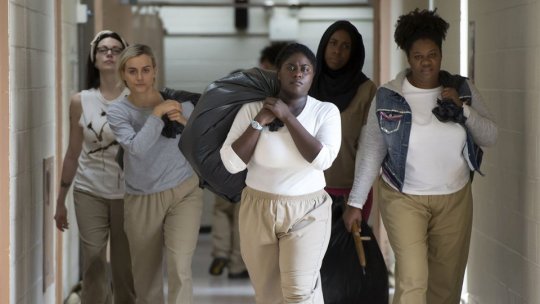
The lives of the women at Litchfield Penitentiary, a minimum-security prison in upstate New York. (the annimalllsss the animalllls, TRAP TRAP TRAP till the cage is fulllll...)
This show is about everything the opening titles suggest- women, decisions and time. What’s striking about OITNB is the characters never serve the plot. Plot *is* character. It’s there to serve them. It gives us a framework to waste time with these characters, because ‘all they’ve got is time’.
Season 5 is brave in terms of content and form. There are thousands of people more qualified to speak about the content, so I’ll leave it to them. Form wise: Orange is the New Black is Netflix’s most watched show, and probably it’s major tentpole along with Stranger Things. It has a well-oiled structure. Each season takes place over a few weeks, each episode focusses us in on one character, complete with flashbacks that inform us how they ended up in prison. Season 5 tears that to shreds, setting it basically in real time over 3 days. When it works, it *really* works. There’s no looking away. You feel the grind of what they’re going through. It sometimes leaves them too much time to pad out and we get some boring side plots- but on ambition alone I loved it.
It’s the perfect continuation and accumulation of previous seasons in many ways. The characters you know and love are in extraordinary circumstances. It brings out sides to their personalities that you never knew were there, but fit perfectly. Where all the characters are situated within the prison after the inciting incident is the best use of character geography *as* character I’ve ever seen. Tonally the series has gradually been getting nastier and nastier for a while, but there’s a scene towards the end of this season which is so nasty and so long and REFUSES to cut away even though you desperately, desperately want them too. It’s raw. It hurts. It’s a scene the show has always been heading for tonally and building towards dramatically.
Season 5 slots in just under 4 for me in terms of ranking them all- but it’s still damn good. One things for certain, 5 changed everything for OITNB. The game is different.
Oh, and Nicky’s the MVP.
Netflix.
10. BAD GENIUS (directed by Nattawut Poonpiriya)
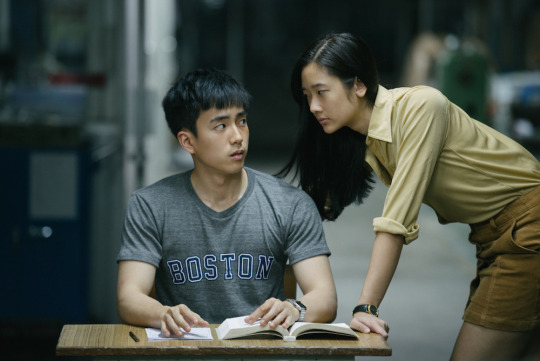
Thai Heist-Thriller. A genius high school student makes money after developing elaborate methods to help other students cheat.
WHAT A FUCKING RIDE!! The most fun I’ve had in a cinema all year. More stakes in this than most ‘end of the world’ superhero movies. Genuinely unpredictable.
The filmmaking is so good it makes you forget plausibility is sometimes being pushed. Amazing set-pieces. Expertly choreographed. Form and content perfectly married. This is the best way to tell this story, like a Michael Mann thriller, a Steven Soderbergh Oceans-style heist.
Every character is so rich and textured in their own way. So fully realised. You’ve met them all at some point in your life. It’s whimsical, but painful and genuinely emotional when it needs to be. Never pulls it’s punches.
2 years time, there will almost certainly be an American remake… and it’ll suck so hard. It’s rooted in Thailand, the socio-economic situation of people, the time zones, the pressure to succeed, and honestly- just hearing it in Thai.
SEE THIS FILM. SEE THIS FILM. SEE THIS FILM. SEE THIS FILM. If you take anything from reading any of this, SEE THIS FILM.
Seen at Vue Leicester Square.
9. NATHAN FOR YOU: FINDING FRANCES (directed by Nathan Fielder)
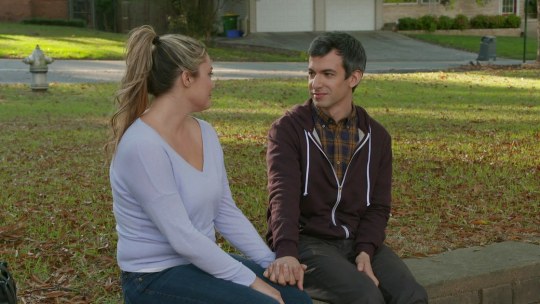
The feature-length finale of Nathan For You’s 4th season. It’s a show that’s difficult to describe without saying ‘trust me’.... but honestly, *trust me*. Nathan Fielder graduated from business school with ‘really good grades’. He offers outlandish solutions to solve problems for struggling small businesses. In Finding Frances, Fielder uses all the resources of his successful show to help an old Bill Gates impressionist track down his high school sweetheart. Trust me.
Nathan Fielder has accidentally and totally on purpose made one of the best documentaries of the last 10 years.
It’s funny how we remember things. Reality and fiction are blurred. Truth is irrelevant. What does real mean? Does it even matter if we remember it how we want to?
Laptop.
8. THREE BILLBOARDS OUTSIDE EBBING, MISSOURI (directed by Martin McDonagh)
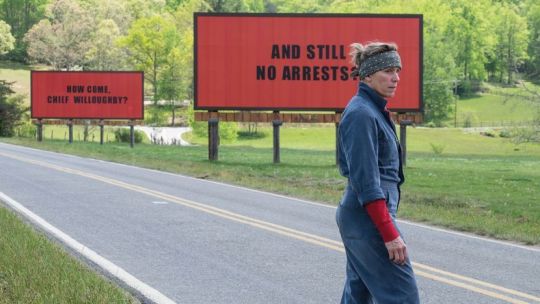
A mother takes desperate steps to pressure local law enforcement to find her daughter’s killer.
Perfectly woven and layered characters. I fucking hate the phrase ‘the character arc’, but if I were teaching a class in it- I’d show this film.
A film about relationships, and every relationship between every character or creature or inanimate object is perfect.
McDonagh loves theatrical sensibilities. Nobody does grand, rich set-pieces quite like him… makes highly stylised situations feel real in the world he sets up.
I could have watched hours more of these characters interacting.
Seen at Embankment Garden Cinema.
7. BLADE RUNNER 2049 (directed by Denis Villeneuve)
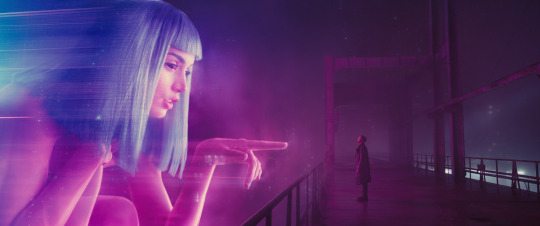
Neo-noir, sci-fi sequel to Ridley Scott’s 1981 classic.
I’m not a fan of the original Blade Runner. I appreciate it! It’s beautiful! and groundbreaking! but I just find it so heartless and cold. I just can’t connect to it. The best sci-fis are amazing stories with really fun furniture (the gadgets, tech etc.) The original is too much furniture for me. In other words, I had no reason to like this one IP wise. 2049 takes everything that could have been interesting from the original and expands on that. The furniture is just that- furniture. An amazing setting that enriches and serves the story. Everything is there to tell the story. I left the cinema feeling I’d experienced something the way that everyone talks about experiencing the first one.
The most expensive art film ever made. I literally cannot believe this exists. I cannot believe they gave Villeneuve £185MILLION to make a 3-hour long, philosophical film that has no blockbuster tropes: no loveable rogue hero; no ‘off-beat’ quippy humour to keep you interested; no CGI extravaganza 3rd act; NO.FUCKING.SKYBEAM with floating garbage spinning around it that threatens to destroy the world and the heroes have to stop it before everyone in the world dies; no setting up 5 other already planned sequels in the franchise so nothing important happens in this one. It’s a rare type of blockbuster in 2017- one that trusts it’s audience is intelligent.
Denis Villeneuve really is the most exciting director working today. This is just further proof. Arrival (2016) still my favourite of his, but I’m almost more in awe of him for this. Taking such a well-loved franchise and doing something new with it in a way that still feels respectful of what’s come before. It’s his film.
The only use of Hollywood’s new trend of digitally recreating actors (ala Peter Cushing in Rogue One: A Star Wars Story) that will ever matter. THIS is how you do it well.
Gender politics (we’re gunna’ go there, SPOILERS AHEAD and I know my opinion doesn’t really matter or count for anything on this just thought it’d be silly not to bring it up, feel free to disagree, v. interested to hear what everyone thinks about this!!) Lots has been written about the treatment of female characters in 2049. Most apt example I can think of to explain how I feel- Taxi Driver (1976), there’s a cafe scene in which the camera lingers on some black characters for uncomfortably long in a kind of parading manner, a ‘look at how terrible these guys are’ manner... it’s very understandable why one could interpret the film itself as racist. I’d argue the film is completely aware of what it’s doing- it’s putting us in Travis Bickle’s eyes, who is a racist character. I mean, we’re literally in his head the whole thing, hearing what he’s thinking and seeing what he’s seeing... I guess what I’m saying is- ‘it’s a decision.’ It’s not an offhand random shot where the filmmaker’s own gaze comes through, it’s a skilfully planned decision to make us question and think about something, in Taxi Driver’s case- what kind of man Bickle is. The treatment of women in 2049 *IS* a decision. It’s not Villeneuve lazily commodifying women, it’s him saying a world where women are only a commodity is a fucking bleak one. It’s a world where real women have been rendered obsolete because the height of success in our society (the CEO of a large corporation), an egoistical white guy with a god-complex manufactures life so women aren’t necessary for continuing the human race, and creates holographic partners for everyday men so they’re emotionally fulfilled without having to engage with actual women. And it’s so horrible. I mean, is anybody happy in this film? Is the picture of the future this film paints bright? It’s a film about how the arrogance of men will destroy everything. And on a base story level, it’s literally about guy who thinks everything is about him... but it turns out to be about a woman. Perhaps it’s lazy for the film to make the decision ‘it’s a patriarchal world so all the women are prostitutes and are treated badly so we’re just gunna’ do that’, but I dunno’... I think there’s more going on. I think Villeneuve is too good for that. I mean his last film was literally about a genius female linguist being the saviour of the world and how a mother’s love is the most precious thing. Would he really do such a U-turn and make a film where the female characters are just objects to be gazed at? I mean- maybe?? If any other aspect of the film felt like it was the studio meddling with Villenueve’s vision I’d buy that... but it’s just SO his film. And I think he’s clever enough to know who the primary audience of this film is- geeky 20 year-old guys. He draws them in with the surface (and all too familiar) images of the female characters, and then turns all of that on it’s head. Just my opinion. Obviously I can never be completely impartial- very happy to be converted the other way.
Seen at Picturehouse Central.
6. CALL ME BY YOUR NAME (directed by Luca Guadagnino)
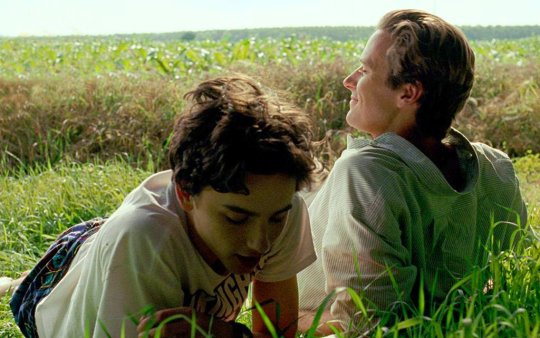
Somewhere in Northern Italy, Summer 1983, Elio’s life changes.
Sun-drenched Europe, the smell of warmth and twirling cigarette smoke, deep blue sky- pure, breakfast with a glass of apricot juice and an espresso, the sound of bike spokes spinning lazily.
I wish I could live with these people.
‘Later.’
The rawest and best final shot in the last 10 years.
Seen at Odeon Leicester Square.
5. THE BIG SICK (directed by Michael Showalter)
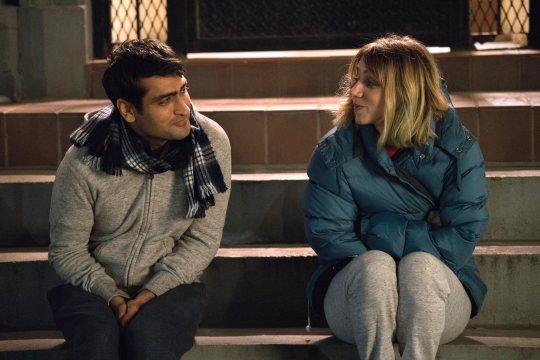
A Pakistani-born standup comedian/Uber driver and a grad student strike up an unlikely relationship.
MAGIC. The perfect retort to use when someone says ‘all rom-coms suck’. A genuine slab of gold that’s as funny as it is heartfelt. And it’s just SO the kind of thing I like.
I’m unbelievably bored of films and just art in general that’s terrified of being sincere in fear of being labelled sappy or over-sentimental. The Big Sick says ‘fuck you’ to that school of thought and goes for it.
Comedy, romance and drama are effortlessly blended- sometimes all in the same scene. And it never feels off-kilter, mainly due to the amazing performances. Kumail Nanjiani, Zoe Kazan, Ray Romano, Holly Hunter and the rest of the cast always play the truth of the scene- not the humour, the romance or the drama, just the TRUTH of the moment.
The perfect antidote to the year 2017 in general.
Seen at Aldeburgh Cinema.
4. YOU WERE NEVER REALLY HERE (directed by Lynne Ramsay)
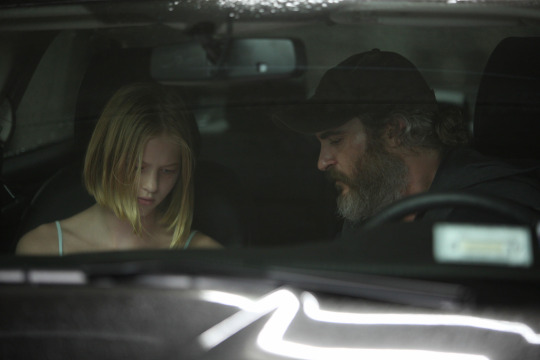
Gulf War veteran Joe rescues children from trafficking rings.
This is a horror. And more terrifying than any jump scare, this whole film is populated by ghosts.
Deeply troubled, deeply disturbed. Beautiful. Precise. Scatter-brained. Focused. A violin strung too tightly, then played by a madman. How can something so stripped down and raw feel so symphonic and wholesome?
There are things in this that will play on loop in my head for the rest of my life. Images and sounds so seared into my brain they find me at the strangest of moments in a day, and I’m always left thinking about them for the rest of that day. It’s clever like that. Joe can never escape what he’s seen.
Francis Ford Coppola famously told press at the 1979 Cannes premiere of Apocalypse Now - ‘My film is not about Vietnam. It is Vietnam.’
You Were Never Really Here is not about PTSD... it is PTSD.
Seen at Odeon Leicester Square.
3. LOGAN (directed by James Mangold)
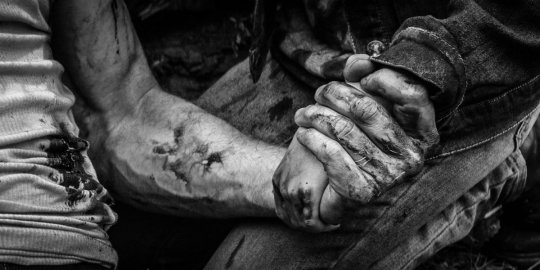
Wolverine’s last outing.
I’m not a huge fan of superhero films. Most are fun. Most are also lazy. Few will survive the test of time. Those that will use all the tricks in their genre box and do something interesting with them, transcend- Rami’s Spiderman 2 (2004), Bird’s The Incredibles (2004), Nolan’s The Dark Knight (2008)... and Mangold’s Logan.
So aged. So weary. Everyone is tired. Tired of running, tired of fighting, tired of living. Like three sharp metal claws jaggedly tearing through flesh, nothing is polished about this. Bloodshot eyes, skin like leather. He feels so much regret. Like most real heroes, he mourns those he couldn’t save rather than celebrates those he did. And it’s eaten him up inside for the hundreds of years he’s lived.
Here I go talking about furniture again... but every piece of furniture (superpowers etc.) is there to serve the story (and here the characters are story). Like so many blockbusters and superhero movies fail to do, this film is about something other than the furniture... e.g. how do you tell a story about dementia that gives someone who hasn’t experienced a family member suffering from it *that* feeling of sadness, loss, embarrassment, empathy and frustration? You give it to Charles Xavier (played by Patrick Stewart), a character you’re use to seeing as the leader, who always has a clever plan up his sleeve and has the ability to control other’s minds. You give it to him, and you force everyone watch the person they respected the most have to be lifted into bed while screaming about fast-food. It’s heartbreaking. Complex. It’s actually about something other than how in superhero world teamwork saves the day. Every ‘plot point’ and moment tells us something about these characters, even to a fault sometimes. SUBTLE: Logan pulling them jammed claws the way an old boy down the pub with arthritis feels his fingers. UNSUBTLE BUT STILL INTERESTING: making Logan fight the only thing he’s truly scared of- literally the version of himself that blindly obeys orders.
Everyone is SO fucking real. Just *watch* the way Daphne Keen eats that bowl of cereal.
Would highly recommend watching the ‘Noir’ Black & White version.
mild spoilers: It also features the best single edit of the year, from Laura stabbing the shit out of some dude to a flurry of scattered drum beats in the score... then that piercing animalistic roar rips through and all is silent... she spins.... from this:
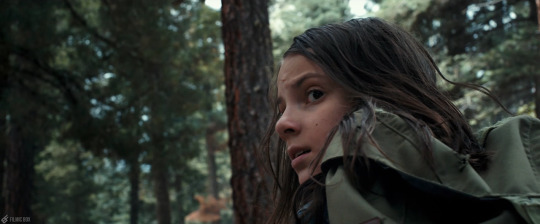
CUT to this:

An empty forest, the roar echoes out... a low bass note tolls like a funeral. Something is coming. Help is on the way, but it’s an untamed, ruthless, violent help. He’s near...
No one single cut has ever given me chills like that before.
Seen at Odeon Leicester Square & Picturehouse Central (Noir version)
2. TWIN PEAKS: THE RETURN (directed by David Lynch)
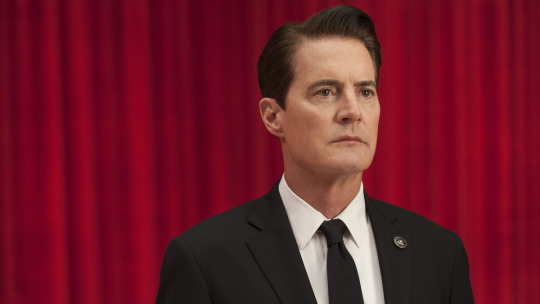
Agent Cooper’s odyssey back to the small town of Twin Peaks. The original series of Twin Peaks that aired in the early 90s is often cited as creating ‘prestige’ television as we know it today- your Game of Thrones’, HBO high-quality, Netflix and so on... 25 years later, David Lynch and Mark Frost have returned to kill it.
Earth-shattering. Groundbreaking. An 18-hour film (split into 16 parts) so layered, so complex i’m not even sure where to begin... and most of what I have to say has probably been written by someone else much more eloquently.
For the first 9 hours, I found The Return mostly frustrating. I love the original series so, so much (and the prequel film Fire Walk With Me is one of my favourite films of all time). When I hit hour 10, it was like all the clouds in my head suddenly cleared. I ‘got’ it. What I thought I wanted was all my favourite characters back again talking about cherry pie and coffee with that soft romantic filter. Lynch and Frost (the creators) knew I wanted that. They also knew I didn’t *really* want that... because, the original series will always exist. They knew nothing would disappoint more than a soft reboot. The Return is it’s own thing- within the universe of Twin Peaks, and... within the actual universe. Seriously, how can you categorise this? It jumps from screwball slapstick comedy to silent black and white existentialist horror to 10 minute live band performances... what is the point of even trying to categorise it?
On some of the individual parts:
Part 3 is a low-fi, surrealist, near silent masterpiece.
Part 8 is... ‘Pure Heroin Lynch’ and has already changed TV forever.
Part 11 is the most satisfying instalment, fulfilling storylines from the original series in a measured and poignant way.
Part 17 is the conclusion we wanted, sort of...
Part 18 is the start of a new mystery, and one of the most haunting things I’ve ever seen.
Twin Peaks will change you life.
Seen on Laptop.
1. THE FLORIDA PROJECT (directed by Sean Baker)
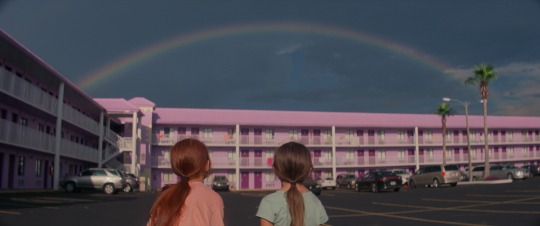
In the shadow of Disney World, 6 year-old Moonee and her friends spend the summer playing around the Motels they live in, while her mother Halley struggles to find a new job.
Pastel bright colours. Every person has survived a storm. Explore the wasteland of failed corporate America. Become a child again. The endless spinning of helicopter blades, a constant reminder of what they can’t do- escape.
Doesn’t ask you to like the characters. Doesn’t need to. Moonee has seen too much. Halley’s anger at herself and her life bubbles underneath every word and action, but she just doesn’t know how to fix it.
It is *SO* achingly beautiful it hurts. I find it hard to even watch the trailer without crying.
For the problems that face Moonee, honorary queen of The Magic Castle Motel, and the impending darkness that’s sure to come, she has the most powerful gift of all- finding hope where there is none.
‘See, I took you on a safari.’
Seen at Odeon Leicester Square & ICA.
DISCLAIMER- things that are not out yet in the UK/I shamefully haven’t yet seen and would likely be on my list too:
Lady Bird (further DISCLAIMER i would actually kill somebody to see this)
A Ghost Story
Raw
Phantom Thread
War for the Planet of The Apes
Coco
American Vandal
Mindhunter
BEST SCENES:
The third thing I learnt this year- it’s impossible to talk about a specific scene in a film without spoiling it. So... SPOILERS.
The Stairway Fight - ATOMIC BLONDE (directed by David Leitch)
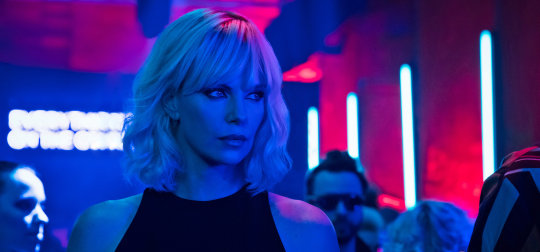
If someone could tell me what the fuck was going on in Atomic Blonde that’d be great but until then I’ll just marvel at how amazing the fight sequences are. Charlize Theron again puts herself at the centre of the progression of American action cinema following her iconic performance in Mad Max: Fury Road (2015). From the first time we see her, lying in an expensive bath healing her wounds and soothing her bruises, we know at some point we’re going to see how she got them. CUE: The 15 minute stairway fight sequence, made to look like a single continuous shot. Leitch and Chad Stahelski (his frequent collaborator and director of the also brilliant John Wick: Chapter 2) are determined to show general audiences what good action scenes look like. This 15-min beauty harkens back to the almost dance like hospital shootout in Hard Boiled (1992), with the rawness and determination of a Children of Men (2006) tracking shot. Charlize Theron (as MI6 agent Lorraine Broughton) fights her way through swarms of henchmen over several floors of an abandoned block of flats, all the while trying to protect Eddie Marsan (who wouldn’t want to protect Eddie Marsan??) Every punch, kick and throw HURTS. By the end, she and the final henchman are so exhausted there’s a sense they might just call the whole thing off- but something pushes them on. Oh, and there’s a 5 minute car chase all part of the same shot to end. Also features the BEST LINE OF 2017. In retort to the final henchman strangling her desperately whispering ‘Take this, bitch!’, she turns the tables, stabs him up hard, then before delivering the final knockdown, pushes her nose to his and asks- ‘Am I your bitch now?’ She doesn’t wait for a reply.
The Eyeless Woman - TWIN PEAKS: THE RETURN (directed by David Lynch)
youtube
Lynch’s best nightmare.
Train Hysterics - LAST FLAG FLYING (directed by Richard Linklater)
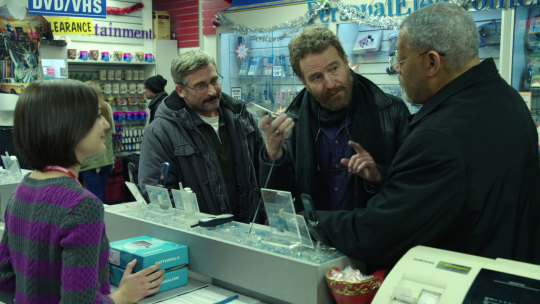
2003. A Vietnam veteran recruits his two oldest buddies, who he served with, to accompany him on a journey no one should ever have to take.
I liked this movie a lot- just missed out on the top 12 list. The standout scene happens little over half way through, the characters sitting in a storage carriage of a train talking about losing their virginities. It’s the best ‘characters uncontrollably laughing’ scene since The Intouchables (2011).
The Snowball epilogue - STRANGER THINGS 2 (directed by The Duffer Brothers)
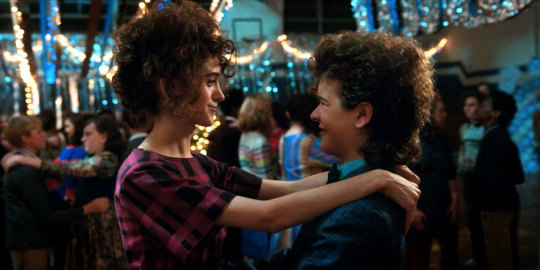
Stranger Things season 2 was super mixed for me. I enjoyed it a lot. Kind of.
The first series is a perfect little story, with a perfect beginning, middle and end. I god damn *love* it’s characters so, so much. The plot was simple remixed 80s nostalgia beats, but really just a vehicle for you to get to know Mike and Eleven and Nancy etc. Think about how much each and every scene was practically designed to reveal more about who they were. It was so beautiful. Season 2 however had wayyyyy too much plot which was obsessed with itself and how cool it was and as a result left characters with nothing to do. In other words, in Season 1 all the characters had something to do because the plot came from them, in season 2 characters were given plot roles... like, explain to me what Mike did all season before he saw Eleven again at the v end of episode 8?? What did Jonathan’s storyline tell us about him we didn’t already know? Sure, they don’t have to set up who they are all over again, but the best sequels never take for granted we love the characters- they give us new reasons to love them.
It’s clear to see whose storylines had natural progressions from season 1 and they knew where they were going, and those they had to think of something because Netflix desperately wanted another season quickly. The only original characters season 2 really worked for were Steve and Will. ‘Steve The Babysitter’ was the perfect progression for his character- him voluntarily discarding his Alpha-Jock status, seeing it was all bullshit, now his caring side comes out. Fuck, think how much you disliked Steve all of Season 1 compared to how much you love and deeply want him to be ok at the end of season 2. THAT’s good writing. His storyline was perfect for his character, it kept giving us new reasons to love him. And Will. Holy shit. His descent into Reagan-level possession was the most engaging part of season 2. Basically all of the story came from him. And Noah Schnapp is so damn good. I think simplicity is the key. His story was unpredictable till the last moments, when you realise it was inevitable. It has a clear premise, unlike most of season 2.
In the first, there were very clear overarching premises from the start- Will Byers is missing, Eleven has escaped from the Lab, the Demogorgon is on the loose. Simple premises that allow our characters to manoeuvre around... Season 2 doesn’t really have one other than Will is clearly still connected to the Upside Down... the Mind Flayer doesn’t really start as a concept till the penultimate episode... Hopper and Eleven living together maybbe?? but we’re not really given enough time with them. Everyone else is left with nothing to do, or something that doesn’t really serve their character... UNTIL THE LAST 15 MINUTES.
The Snowball epilogue was like coming to the surface after swimming laps underwater- I sort of enjoyed the laps but I’d rather just be able to breath. All the self-indulgent 80s nostalgia *plot* is done, and all the characters have interesting things to do!! Steve giving Dustin tips dropping him off, and then that longing look he gives towards the hall. Dustin realising ‘I don’t look like Steve Harrington’ after being rejected by every girl at the ball and dejectedly crying... and in comes Nancy to save the day!! Genuinely one of the most beautiful moments in anything all year (notice how we learn more about Nancy’s true nature in this one moment that anything else she really did all season??) Jonathan nearby keeping an eye on Will and being his helpful self taking the Ball pictures. Lucas ignoring what the rest of the group think about Max and asking her to dance. Will actually going to the ball, acting as normal as he can and dancing with someone!! Joyce and Hopper nervously wait outside and reminiscently share a smoke as they did in their highschool days- contemplating on how they probably won’t ever feel like they aren’t worried about their kids... and finally Mike and Eleven just having a bit of happiness for once- actually going to the Snowball together, a beautiful conclusion after speaking about it at the end of Season 1.
As each moment passed in this glorious sequence, I loved the characters more and more. They aren’t doing anything supernatural or life threatening, but the stakes feel SO much higher than they had all season. It’s real. They aren’t shackled with ‘advancing the plot’, they can just be themselves. And I loved it.
BEST CINEMATOGRAPHY:
Time’s Arrow, Episode 11, BoJack Horseman Season 4 (created by Raphael Bob-Waksberg)
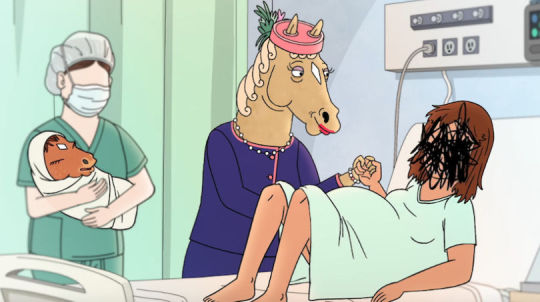
BoJack Horseman has been the most visually beautiful cartoon for a while now, it’s breathtaking season 3 silent underwater adventure Fish out of Water helped to gain it much appreciated wide applause. Time’s Arrow is a different beast. Genuinely horrifying. A mind cracked into a thousand pieces and glued back together into something resembling crazy paving. The animation is disturbing. Really disturbing. The nightmarish images running through the failing mind of an old woman with dementia. Images of her regrets, the neglect and abuse at the hands of her parents. Memories burn and melt away like plastic in a fire. The faceless humans and constant scribble over Henrietta’s face haunts me. Beyond the obvious sinister imagery, it means something. A puzzle with too many missing pieces to really make out what the picture actually is. And we’ll never really know.
It’s not the first thing that pops into mind when you think of ‘cinematography’, but Time’s Arrow is the best visual storytelling since... the previous season of BoJack Horseman.
BEST PERFORMANCES:
Cate Blanchett as various in MANIFESTO (directed by Julian Rosefeldt)
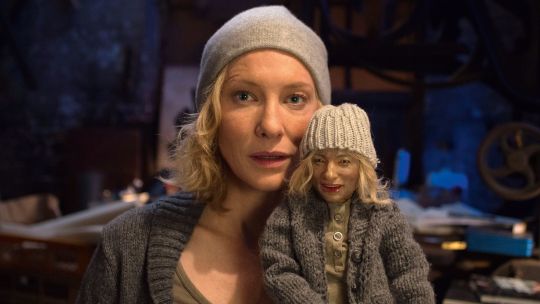
Originally a critically acclaimed multi-screen video installation in which Cate Blanchett plays 13 different characters, ranging from a school teacher to a homeless man, performing artist’s manifestos in 13 different scenarios. Part of the financing deal was Rosefeldt had to cut a 90 minute, linear version of the piece for a cinematic setting.
NO one could have pulled this off like she did. She’s running on adrenaline and pure bravery. She makes interesting choices at every twist and turn. How does looking at her never get tiresome? Every jump from character to character feels genuine. She blew my mind- I knew I was looking at the same person over and over again, but I also *knew* I was looking at 13 different people.
A masterclass.
Kyle MacLachlan as various in TWIN PEAKS: THE RETURN (directed by David Lynch)
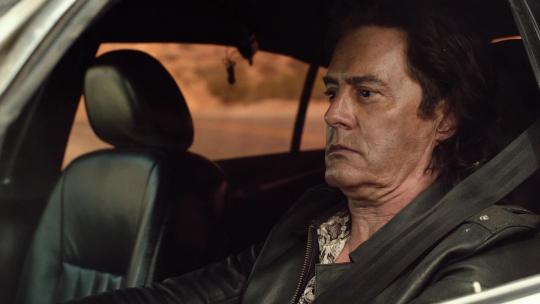
2017 is the year of staggering ‘multi-character’ performances. Kyle MacLachlan’s involvement in the new season of Twin Peaks was basically the only thing anyone knew about it going in. And he is the heart of this season in so many ways. Returning to a character 25 years later must be a daunting prospect, but MacLachlan shows no fear. Not only does he play the pragmatic, joyful Agent Cooper we all know and love, he plays his steely, pure evil doppelganger Mr C, child-like amnesiac Dougie Jones and in the final episode... someone quite special. And he makes it look so damn easy. He is the fabric that holds together The Return.
THE ‘KIDS’ in EVERYTHING
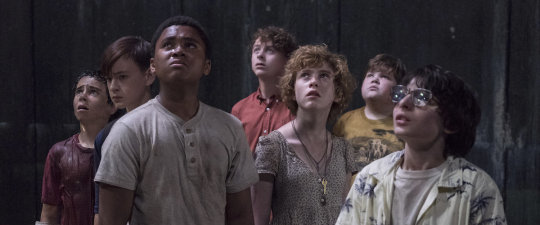
2017 has been a bad year for Hollywood. Ultimately though, it will be looked back on as the turning point. THINGS CHANGE NOW. The old guard is running from their past scared. And they should be scared. Uma Thurman is coming to murder them all. There is no room left for the Harvey Weinstein’s, the rotting core of top-down abuse has been exposed. Brett Ratner can fuck off with his swaggering playboy image and terrible movies.
What is truly uplifting is who is going to replace them. A new generation of pure, true artists that this year has shone a spotlight on.
The future is Brooklynn Prince and Bria Vinaite, stars of The Florida Project.
The future is Timothée Chalamet, whose central performance in Call Me By Your Name is the realist, rawest thing ever.
The future is Saoirse Ronan, the next Meryl Streep.
The future is Daniel Kaluuya, who has finally gained world-wide recognition for his stunning leading performance in Get Out.
The future is Finn Wolfhard, Millie Bobby Brown and all of the kids from Stranger Things, who masterfully manage the horrific pressures of being thrust into the tabloid spotlight at the same age most of us just want to cry in our rooms.
The future is Sophia Lillis and the rest of the Loser’s Club from IT (a film with the most oppressively terrible sound design ever yet they still manage to make it fun and watchable.)
The future is Daphne Keen, the best on-screen cereal-eater who almost steals the film from Hugh Jackman in Logan.
The future is Lucas Hedges, someone with rare human fingerprint over every word he speaks in Three Billboards and last year in Manchester By The Sea.
The future is Donald Glover, the most creative, multi-talented young artist alive.
The future is Caleb Landry Jones, who’s had maybe the most impressive year, with standout supporting roles in The Florida Project, Twin Peaks: The Return, Get Out and Three Billboards Outside Ebbing, Missouri.
The future is Tessa Thompson, the best thing about Thor: Ragnarok.
The future is Michael B. Jordan, Chadwick Boseman, Lupita Nyong'o, all the team behind the upcoming Black Panther film, helmed by Ryan Coogler.
The future is Barry Jenkins, director of best picture winner Moonlight.
The future is Daisy Ridley, John Boyega, Oscar Isaac, Adam Driver and Kelly Marie Tran, the new faces of the most popular franchise ever.
The future is Alice Lowe, a force to be reckoned with. Writing, directing and starring in a feature film is difficult enough. She did all of that while heavily pregnant. Oh, and it was her debut feature. It’s called Prevenge and it rocks.
The future is Ava Duvernay, a beacon of hope- cannot wait for A Wrinkle in Time, which drops early next year.
The future is Sean Baker, the most empathetic filmmaker working today.
The future is Patty Jenkins and Gal Godot who have revolutionised the superhero film and inspired a generation of little girls with Wonder Woman.
The future is Kumail Nanjiani and Zoe Kazan, who I’ll follow in whatever they do after The Big Sick.
The Future is Jordan Peele, the most exciting new director.
The future is GRETA GERWIG, mumblecore queen turned saviour of cinema.
So, what did I learn this year? Well, Agent Dale Cooper is certainly one of the best characters of all time. But most of all: amongst the darkness of everything that’s happened within the film industry in 2017... there’s hope.
The future is bright.
1 note
·
View note
Text
Interview with PhD Candidate Brian White (Part 1)
I saw Brian White’s name for the first time on a tweet by critic Kotani Mari in September 2018. According to the tweet, he is a PhD candidate at the University of Chicago who conducted an academic presentation about Tobi Hirotaka at a conference titled “The Nonhuman in Japanese Culture and Society: Spirits, Animals, Technology," which was held at the University of Victoria, Canada.
I wondered at the time what it must be like to study Japanese SF outside Japan. I assumed most of the old books and magazines in the genre are not digitized nor easy to access from outside Japan. Fortunately, I got a chance to ask Brian directly what brought him to Japanese culture and science fiction. (I am deeply grateful to Dr. Pau Pitarch Fernandez for introducing him.)
This interview was recorded in Shinjuku, Tokyo in November 2018 during his one-year stay for archival research. The interviewer is me: Terrie Hashimoto. You can read the Japanese translation here.
Note: Throughout this interview, Japanese names are given in the Japanese order, family name first, then given name.
Brian White (BW): I grew up on the east coast of the United States. I was born in New York, but my parents divorced after I was born. My mom went to Pennsylvania and my dad went to New Jersey. I spent most of the time with my mom in Pennsylvania but regularly visited my dad as well. So where I grew up is a little bit complicated but it was basically back and forth between Pennsylvania and New Jersey.
Both of my parents are very intellectual and academic-minded. My dad has a PhD in Molecular Biology and spent some time working at a university before transferring to private industry. My mom, though she never finished college, majored in English Literature and always had a strong commitment to ideas about what it meant to be literary and well-read. She was always pushing me to read books.
I was born in 1988, so I was growing up during the boom of YA literature in the ‘90s. There were a few popular series in the US; one of these was called Goosebumps. And then of course there was Harry Potter, and also Animorphs, so you had Horror, Fantasy, and SF all together [in YA series]. Mystery books were popular as well, like Nancy Drew, though I guess that was from the '60s or '70s. All of those subgenres were present in YA. I really enjoyed Animorphs series. I found it extremely interesting because the main idea of the series is children who can change into animals and go and fight evil aliens. Stylistically I always found it fascinating how the author put you into the story and made you feel what it would be like to be a tiger, an ant, a falcon or whatever through first-person narration. That sense of being completely different creatures was very attractive to me. I read so much SF as a young child. I think that's why anime like Dragon Ball were eventually so interesting to me when I started watching them in middle school.
I remember when I was in middle school, the only television network that played anime was called Cartoon Network and you could only get it if you had a special kind of cable package. And I just remember seeing advertisements for Cartoon Network on other channels and seeing advertisements specifically for Gundam Wing. I wanted to watch it so badly! My parents finally did get upgraded to premium cable or whatever it was to have Cartoon Network. Unfortunately, they'd stopped playing Gundam Wing by then. I was very sad about that. But they were playing things like Dragon Ball Z and Gundam 08th MS Team - which was a kind of jungle warfare sort of thing - and things like Cowboy Bebop and Trigun, which my generation considers to be classics. I'm sure that others have other opinions of them, though. They seem to have become much more popular in the United States [than Japan]. It was eye-opening.
So over the course of middle school and high school, I guess I drifted away from sci-fi literature itself, and more into things like anime and manga. I started reading manga volume after volume. I consumed anime and manga voraciously. I read a lot of Shonen Jump titles. I think the first [manga] I ever bought was Naruto Vol.1, and I really enjoyed that.
I moved into being interested in Japanese popular culture because of a few reasons. Maybe I should have mentioned this before, but I first started getting into Dragon Ball when my cousin came to stay with us for a little while on vacation. He brought a Dragon Ball manga with him, and it was the first time I'd ever seen a manga. I was shocked at how it was read, in my mind, back to front because it was in the Japanese reading order rather than the American order. This was just a “へえええ (Whaaat!)” moment for me when I was 12 or 13.
Shortly after that I found out that Power Rangers was Japanese. I had watched Power Rangers so much as a child. I forget exactly which series it was, but the one with dinosaurs. That was my favorite television program as a child. And to find out that it was actually Japanese years later really shocked me. There's another, I think I hadn't even thought of it as anime at the time, called Speed Racer in English. I'd watched that and thought of it as just the same as Looney Tunes or Snoopy or something when I was a kid. And so to find out that these two shows that I had really loved were both Japanese, it was really surprising and made me want to learn more. I think that was one of the reasons why I became so interested in anime and manga.
The other reason was just that it felt different or I guess you could say exotic to me, living in a kind of rural town. I had always dreamed of getting out of my hometown, going somewhere larger. [Japanese popular culture gave me] a feeling of being connected to something bigger and maybe more exciting, a world outside that was very alluring to me.
And then the time came to apply for a college. I really didn't know what I wanted to do when I grew up. I had good grades because my parents were very strict about doing schoolwork and getting good grades. [I figured] I could probably get into a pretty good school. I was going to try to get into a school that had a Japanese language and culture program and also a lot of other majors that I could try out. I ended up going to the University of Pennsylvania and they had a fairly good Japanese program there.
I declared my major basically as soon as I walked in the door. I guess the professors didn't quite know what to do with me because most people go to the Wharton [Business] School or go into international relations and then also take some classes in Japanese as a second major or a minor. They were more used to that kind of student, I think.
But I really wanted to do Japanese, so I took courses in Japanese cultural studies and literary studies and studied in Kyoto for a semester when I was a third-year student. All through that I kept an interest in popular culture. But just because of the way that the classes were structured, doing more mainstream Japanese literary readings, I drifted away from consuming SF very regularly at that time. As I was finishing college, I decided I wanted to do more in-depth research, perhaps involving SF in a broad sense. The thing I liked the best was reading and writing about Japanese culture and the sort of insights that gave me into how culture works more generally and being able to turn that around on American culture, that sort of thing. As I was looking around at what I wanted to do and how I could keep doing that kind of work, academia was the thing that came up. But there are a lot of people working on [popular cultural studies], so I thought I could maybe do literary studies and then also fold in film studies. I really like working with film, and it was shortly before that time that I took a post-war literature and film class with Kano Ayako sensei (*means teacher or professor in Japanese). She was so inspirational to me in terms of what one can do, and that was where I encountered Abe Kobo for the first time. We read Woman in the Dunes and watched the film adaptation, and I was like … MY LIFE IS CHANGED. I was just so fascinated by his style. I read Woman in the Dunes in English, and I had a chance to read a little bit more of his writings in Japanese at home soon after, and I thought that they were just amazing. So I said, “Okay, I'm going to go to grad school and I'm going to get a PhD and write a dissertation about Abe Kobo and surrealism and politics of the 1960s.” That's what was thinking when I went to grad school. And a few things happened.
For one thing, I found out that a lot of academics were already working on books about Abe Kobo that would be coming out within the next couple of years. So as for books and dissertations and all that sort of thing, from a business perspective, there wasn't going to be much demand for new professors who specialized in Abe Kobo by the time I finished.
I thought, OK, maybe it's time to rethink this, and I'd had this idea in the back of my head. I'm not sure where it started, but the one thing that I had been interested in talking about with Abe Kobo and the Surrealist movement was its relationship with technology and how technology interacts with the body within Surrealist literature. I was really interested in that relationship and so I started trying to push on that more. Around that time, I was studying at the Inter-University Center for Japanese Language Studies which is an intensive language training program in Pacifico Yokohama. I was trying to explain to a sensei there what I was interested in because during the program everyone has the opportunity to do guided research into whatever topic they chose. I was trying to explain my topic to my sensei, and because my Japanese wasn't great at the time, and also because I didn't have a clear idea of [the topic] myself, I was having trouble putting it into words. As I was rambling about technology and the body, he said, “You mean SF?”, and it was another lightbulb moment. What I was trying to talk about, it really was SF literature, or at least I'd have an easier time finding materials and finding [texts] that worked with the body and technology within science fiction. It was really because Abe was a science fiction-esque author that his work interested me.
I changed course in my third year of graduate school [and said], “Okay, actually what I'm going to do is study science fiction and think about how science fiction talks about embodiment and what sorts of bodies are presented within science fiction, whether you see women or racial minorities and so on.” As I started to slowly develop that thesis, as a result, I felt like I was always kind of behind in trying to catch up to people who have known what they're doing from day 1.
Since I started at the edges [of that topic], it's always felt like I need to read more and study more and do more and try to catch up... in that sense it's been a little bit stressful, especially because I'm now in this program with faculty who were maybe better equipped to help me a couple years ago than now. But luckily my advisors at Chicago are very kind and very knowledgeable about just about everything. Even if they don't know a lot about science fiction, they can help me in other ways.
But yes, it's been challenging to try to study [as a topic]. There aren't a lot of materials translated into English, especially, and there's not as strong a scholarly body of literature, so it's a little bit harder to know where to look. I've been finding my own way. However, I think there are more and more people who are starting to write about [Japanese] science fiction academically in the United States. It's been very helpful to start to talk to them and form that kind of community. I don't know if you know the Parallel Futures series that's coming out through the University of Minnesota press. It’s a series of translations, and they did Aramaki Yoshio’s The Sacred Era (tr. Baryon Tensor Posadas, 2017). They're coming out with a bunch more, and I've had a chance to meet with the sensei who are behind it. Thomas Lamarre and Tatsumi Takayuki sensei are two of the three main contributors to that. Christopher Bolton might also be working on it. He was one of the people that put out a book about Abe Kobo and specifically looked at his works as science fiction. So that was a kind of the final deciding factor; I can't write that book because someone has already written it!
They're all working on that series and between that and other scholars’ work there's been more materials starting to come out. I know a number of graduate students as well - we're working on similar things. So on the one hand, it feels very exciting because it feels like we're on the crest of something new and exciting. But because it’s this new thing coming into being, you know, it's sometimes hard to find what you need because there just aren't a lot of people who have done that work already. Scholars working on the sixties have mostly focused on “serious” literature. So it's been interesting to try to bring the conversation back around to sci-fi.
And it's been interesting personally to take a number of years off from sci-fi. It's been about ten to fifteen years since I was consuming a lot of SF literature as a fan. Since the SF I used to read was aimed at young adults, to come back into it as an adult looking at sci-fi aimed at adults in Japanese, it really feels very much like entering a completely new space. It's been fun to put that together and get an idea of what's out there and who's writing what and when, who the major authors are and what their classic works were like. It feels very spread out, and it's true that it was. But it's only unknown to me, right, so whenever I talk to people that have been consuming it, like Tatsumi sensei, for example, who's been reading it since it started back in the 60s, you know it’s very humbling because he just knows everything. I don't have time to read all the things that he has read, and every time I have a meeting with him and talk about what I'm thinking about, he gives me a suggested reading list three pages long. There's no way I could possibly finish all of it, but it's an exciting challenge.
(Continues to Part. 2)
0 notes
Link
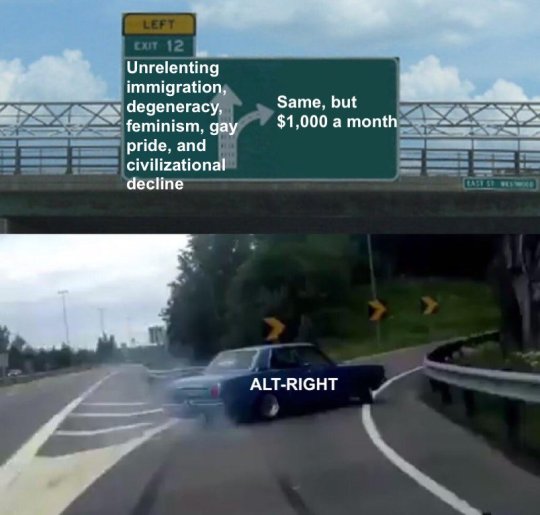
I’ve never voted. Well, I lie, I voted once. I was 18, and my mother sorta forced me. It also felt like some rite of passage, you know, you grow to 18 and you get to do grown-up stuff like voting, having a voice in the political process. I’ve never been into rituals though, and I felt stupid immediately after putting my vote in the box. I didn’t even like the guy! I thought he was retarded. All of them, really. I still do.
Of course ever time there’s an election people would ask me now and then who I’m gonna vote to. I evolved a series of bunch of canned answers. First one was “Nah they all suck”. Then I read Bryan Caplan’s Myth of the Rational Voter and started saying “one vote doesn’t count anyway”. This triggered huge discussions if there was even a single Boomer at home. “But if everyone thought like you nobody would vote!!”.
-“Well sure but my not voting doesn’t influence other people’s behavior”.
“But you have to vote, if nobody voted…”
-“It doesn’t follow that if I don’t vote then other people don’t vote”.
“But you have to vote, if everyone did like you”
-“Where on earth are you taking that ‘if’ from?
“But you have to vote……”
You should try this, it’s hilarious. They just go in an endless loop bug. Talk about NPCs.
…
And then… Trump happened 3 years ago. It took me a while to get into Trump. I didn’t care about elections, you see? Elections don’t matter. It’s all the same. And not being American I knew little about the guy. I’d seen him on TV now and then but besides him being this kinda sleazy showbiz guy I couldn’t care much about him.
But I was on Twitter, and I was watching all the outrage, and man, Trump was good. He wasn’t good, good. He wasn’t Moldbug. Not even Pat Buchanan. Trump is really inarticulate, I don’t know his verbal IQ but he has the vocabulary of a dumb 10 year old. And yet he got his points across. Good points. Drain the Swamp. NATO is pointless. Make America Great Again. China is ripping us off. You’d be in jail. No more senseless wars. BUILD THE WALL. All great, and most importantly, hilarious ideas. Trump was trolling everyone that I hated, the press, the bureaucrats, the whole Cathedral was up in arms against him, and *he was fighting back*. Successfully! He was talking shit to AIPAC! I just couldn’t help myself. Trump was my guy. I couldn’t vote for him, I’m not American, but I would have. Honest to god, I’d wake up early and vote for Donald Trump.
…
Fast forward 2 and a half years later. No wall. No jail for Hillary. Narrowly avoided jail himself! The swamp is a big as always. Forever war still going on. Spending more time tweeting about Israel than his own country. Shits on Ann Coulter and says he wants more legal immigration. Did I mention no wall? What a disaster. Trump has been a huge and complete disappointment. Again, I don’t dislike the guy personally. I mean I never *liked* him. He’s weird, talks like a retarded 10 year old. I’d say I’d probably wouldn’t enjoy having a few beers with him but he doesn’t even drink. But I don’t hate the guy, I think odds are his heart is in the right place. He just can’t get stuff done. He’s incompetent. I mean, it’s hard. It was always hard. One just doesn’t come in as a complete outsider and reform the whole government from scratch. Then again, people who work in the heart of the beast, in Washington DC, tell me he’s just incompetent.
…
So now what? Back to Moldbuggian detachment? Nothing ever changes, huh. The Cathedral really is all powerful. Ever since Trump made some protests about the intelligence agencies being disloyal or outright attacking him, the Establishment feels so powerful they just blatantly say in the press that the CIA are the good guys. Does nobody remember that the CIA being evil was pretty much proven by the 1960s, and that evil CIA ops have been a staple of books and films for decades? Not anymore; they’re not content with being powerful in the shade. They want outright public submission.
Democracy really is a sham; but it’s hard to go back to detachment now that Bioleninism is out in the open. Elections now are openly not about economic policy or social conservatism. Elections now are about the speed of the dispossession of white straight males. It’s for or against Bioleninism. The majority of candidates of the Democratic party are openly talking of “reparations” for black people, i.e. outright Danegeld. And don’t get me started with open hunt to mess with the sexual hormones of white children in schools. It’s going on right there in the open.
The US has an election next year, the campaign is starting now. Given the present demographic trends, it is very likely that Florida, if not Texas, will flip blue very shortly; that means a rock-solid majority for the Democratic party, forever. Donald Trump is likely to be the last white male president in American history. The 2020 election is probably going to be the last election which is more or less contested. Trump does still have a chance.
But Trump is incompetent. He’s not helping. He’s just treading water while another million Third-world immigrants sneak in, another middle-school boy gets injected estrogen because he doesn’t like football, and another hundred-thousand white men just overdose on opioids because you can’t even play a videogame today without being forced to play a black woman avatar. Can you support this guy? I sure can’t. Again, not my nation, but I wouldn’t. I won’t call him a traitor, although many have. But he didn’t build the wall. He’s letting Amazon, Facebook and Twitter campaign openly against him and censor everything to the right, and he hasn’t lifted a finger. He doesn’t deserve support.
…
Seriously though, to the extent Bernie represents a constituency that’s not for instant Brazilification, I wish him well, but he’s old and frail, and his program isn’t very interesting. And most importantly, his own constituency is being taken over by a guy who’s 10 times smarter, is young, has actual good ideas, is not white and will give the Bernie crowd everything they want, and more. Much more.
To be precise, $1,000 a month more.
Come Andrew Yang.
…
He’s the only candidate in this whole race that doesn’t talk like a bugman. You know what a bugman is. All those politicians and corporate guys who talk in that odd and disingenuous jargon designed to obfuscate. High-grade NPCs, that’s what bugmen are. Well, he isn’t. He goes straight to the issues, analyzes them intelligently, and then has a plan. It may be or may not be a good plan. But I dare you to show me a presidential candidate with a higher IQ than Andrew Yang in the last 30 years. That’s even more of a feat because the guy is East Asian, and God knows East Asians tend to be bugmen too.
The guy even wrote a book called The War On Normal People, which is the perfect definition of the Left. I should use it as a subtitle for a Bioleninism book.
…
But a big part of it is just pure appreciation for the guy. Look at his interview with Tucker. You might remember my last post on Tucker, and how he’s revolutionized conservative commentary in the US by arguing that the focus of government should be taking care of working families. Well, Tucker himself liked Yang, and it’s no wonder he did. Yang is the candidate who’s using the closest arguments to Tucker. By far. He’s lamenting the plight of the working man. He’s calling to help the rural white middle class who’s being ravaged by the opioid suicide crisis. Note that Trump has said some stuff about that, and has tried to get China to stop exports of fentanyl, but he didn’t mention white people by name. Yang did, just like that. He’s the only guy who’s not only overtly or covertly calling for your extinction; he’s the only guy on the record for trying to stop it.
…
And, he’s promising to stop it by taxing the hell of the Enemy. Which again, as Tucker mentioned, isn’t a huge abstract thing The Jews or the Left. No. The enemy is Big Tech. It’s Amazon, it’s Google, It’s Apple. It’s Facebook. It’s Twitter. It’s Woke Capital. It’s those guys who aren’t only taking your jobs, they’re using their monopoly in the management of information to censore us, hide us, slander us and ostracize us. You might remember that Trump also hinted at doing something about that. Regulate Facebook and Twitter as utilities to make sure the Right could actually fight the Culture War, and perhaps show that there’s a majority of people against injecting synthetic hormones into 12 year old children. That he’d make big tech build in America and stop avoiding taxes with blatant laundering tricks. Well, Trump did nothing, and he’s avoiding the topic. Yang isn’t. I have nothing against Amazon’s business, but Bezos chose sides by buying the Washington Post and recently going on a censorship spree, banning right wing books from Amazon. He must pay. Yang says he will.
I don’t know if UBI would work. Americans are crying bloody murder about a proposed 10% VAT. I say cry me a river. Europeans have a 20% VAT. It’s annoying, but it’s not a big deal. Smart people say that automation is overhyped, it’s not growing that fast, self-driving cars, one of the biggest talking points of Yang, are likely to not even happen after all. That may be true. But I’d like to say that the beauty of UBI is not that it’s actually necessary in the way Yang says it is, to give people something to fall back on while they find a new job.
Tucker is also worried about the middle class trucker. But Tucker’s answer is to ban automation. Go full Luddite. Yang is talking about automation a lot. But he doesn’t want to stop it. By implementing UBI he wouldn’t stop automation, he’d accelerate it. Businesses would start automating like crazy once people left unsatisfying jobs to go play Fortnite on UBI or try an instagram e-thot career. A big majority of white collar jobs are complete and utter bullshit make-work made by government regulation to keep people busy and have some income to tax. If Yang succeeded in his proposed plan to completely change the regulatory paradigm to adapt to the computer economy at last, companies could actually get rid of all the inefficiencies, and automate everything. Starting with the bureaucracy.
…
Well China is pushing hard for developing AI and automation. Which is weird in a country which could have a serious unemployment problem if automation goes on. But China doesn’t care. Why not? Because China has realized that with Internet and modern computing, they don’t need the corporations to manage the people anymore. They can do it directly. Everybody has a mobile phone with a camera and a microphone 24/7 with them. The government knows your every move. You don’t need to shame people into buying your ideology by threatening with firing them from their jobs, like America does. That’s so 20th century. Now you can control behavior directly with internet surveillance. Social credit is an extension of this trend. It boggles the mind that accelerationists aren’t talking more about this. Not saying it’s a good thing. But the tech is here and it’s happening anywhere. The only place where it isn’t happening is Europe because we’ve outsourced it to American companies.
If you think UBI might work at giving people hope and readjusting the economy in a more just and fair way, sticking it to the oligarchs, vote for Yang. If you just want $1,000 a month, vote for Yang. If you think UBI would crash everything, vote for Yang, as this gay earth deserves crashing. If you just want UBI to show people that democracy inevitable ends with the people voting themselves money and thus proving democracy is a sham and discredit it as a political system, vote for Yang.
And if you want the final death of 20th century politics, and a new paradigm which breaks with the thievery of Boomers inflating the currency so that asset prices are rising through new records every year, while young people have to go through unpaid internships and ‘gig economy’ servitude until their 40s, while the Bioleninist government is busy with the soft genocide of every productive person with natural biological instincts.
Then Vote for Yang. I rest my case.
0 notes
Photo
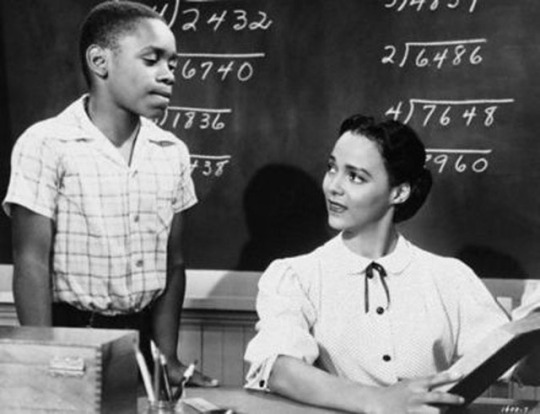
Bright Road (1953)
The quality of work opportunities for African-American actors in Hollywood during the 1950s was simply not there. Outside of the major studios, an industry for race films – a general term for films produced from the silent era into the early 1950s that contained all-black casts and crew (other non-white races had “race films”, but the term is generally understood as predominantly black) – thrived thanks to audiences that wanted to see people who resembled themselves onscreen. These independent studios that released race films, however, were prone to financial woes and institutional disadvantages. After World War II, the major studios began to notice the draw of these films and began casting African-American stars as first- or second-billed stars in non-musical movies (musicals with all-black casts were considered decently marketable, although with this came certain stereotypes).
Most of these early major Hollywood studio attempts to have black actors in these significant parts dealt with race relations – some of these films, like 1950′s No Way Out (Sidney Poitier’s feature film debut), looked at prejudice and racial violence in ways radical even now. So when Metro-Goldwyn-Mayer (MGM) decided to adapt Mary Elizabeth Vroman’s 1951 short story, “See How They Run”, MGM set into motion a film that, by its very modesty, is as radical as the likes of No Way Out. Directed by Gerald Mayer (the nephew of MGM head Louis B. Mayer), Bright Road is completely absent of racial conflict; its story set in a small, racially homogeneous neighborhood and schoolhouse in a pre-Brown v. Board America. Made for peanuts and allocated a shooting schedule of nineteen days, Bright Road would be, to the opinion of MGM executives, a minor financial risk that would not hurt the studio if it failed at the box office. More insidiously, it allowed Louis B. Mayer – wary of outside perceptions of nepotism – to assign his nephew (later nicknamed, “Keeper of the B’s”) a series of lower-budget movies.
Bright Road is certainly a B-picture, and never rises above the common deficiencies – crappy writing, disorganized narrative structure, suspect acting in some departments, unimaginative use of music/scoring – associated with B-pictures. But it is a fascinating film if just for the very fact that the sort of story it depicts – neglected by Hollywood in the 1950s, neglected even now – was ever made into a film.
Somewhere in rural Alabama, Ms. Jane Richards (Dorothy Dandridge) has arrived in an all-black town, beginning her career as an elementary school teacher. Her fourth-grade students are like any ordinary fourth-grade class: some are reticent or talkative, outgoing or shy, bookish or overwhelmed. Of Ms. Richards’ students, C.T. Young (Philip Hepburn) is the most troublesome – though he is artistic and intelligent (his illustrations of caterpillars and other wildlife are impressive), he is detached from his classmates and disinterested in school. C.T. is accustomed to being held back at each grade level, and expects to be held back again before summer vacation. The school’s principal (Harry Belafonte) considers C.T. a, “backward child”, but encourages Ms. Richards to do as she sees fit. Also starring in Bright Road are Barbara Randolph (a future Motown singer credited as Barbara Ann Sanders) as C.T.’s best friend Tanya, Maidie Norman as Tanya’s mother, and dozens of child actors. Vivian Dandridge – Dorothy’s older sister – is a fellow teacher, Ms. Nelson.
Adapting Vroman’s short story to the big screen is Emmet Lavery (whose credits are meager, but include an Oscar nomination for 1955′s The Court-Martial of Billy Mitchell). Lavery’s screenplay – Vroman also assisted in the adaptation, making her the first black member of the Screen Writers Guild (absorbed into the Writers Guild of America, West in 1954) – feels better suited for 1950s television than for movie theaters. The film’s incidents lean heavily on expository passages and scenes never seem to last for a few minutes at a time. It’s as if Lavery was hesitant to keep the drama in a certain space where the audience might further explore the psychology of the characters, any resistance that Ms. Richards’ pedagogical habits might be facing from the administration (Belafonte’s principal is a bit too perfectly aligned with his newest teacher’s opinions). The character of Ms. Richards is provided several instances of voice-over narration along the lines of C.T.-I-know-you-can-do-this or what-should-I-do-now that weakens the screenplay. The screenplay distrusts Dandridge and Hepburn into pushing themselves into a performance that can express those internal monologues; narration like that seen in Bright Road is almost never needed.
Vroman herself was a schoolteacher in Alabama and “See How They Run” was based on her experiences in a classroom. More than Lavery, she would be attuned to how children behave in her community, which allows Bright Road a youthful charm where the children are never too ingratiating on viewers nor are they anonymous figures in service of Ms. Richards’ storyline – the latter being a frequent cardinal sin committed by the “teacher movie” subgenre. Vroman’s short story is also absent of any white characters, and it is remarkable how Lavery remained faithful to that concept despite the potential of executive meddling – which doesn’t appear to have occurred – to insert a white actor somewhere to appeal to a broader audience. The film’s apolitical approach (”apoliticism” being the oxymoron that it is) means the concentration is on the relationship between the teacher and her students. Though the fraudulent practice of “separate, but equal” schools existed then, it serves as background only. Dandridge, considering the history of African-American movies produced within the major studios at this time, was attracted to a film passing on a chance to comment on race relations, saying that the film, “showed that beneath any color skin, people are simply people. I wanted any white girl in the audience to look at me performing in this film and be able to say to herself, ’Why, this schoolteacher could be me.’”
Dorothy Dandridge, one year from starring as the titular Carmen Jones, is fine in Bright Road – though, I suspect that with better writing, this starring turn could have been even more effective. Her tenderness and sensitivity here are well-balanced by a necessary directness and insistence that her students at least attempt their best efforts. Bright Road is also one of very few films in which Dandridge’s own singing voice was used in the final sound mix. For Harry Belafonte in his cinematic debut, he had to pull back from the sensuality that defined his musical career; he simply does not have enough time to establish himself here. C.T. is played by Philip Hepburn in his first of only two on-screen performances – the other coming in a 1957 episode of the television series The Big Story. From what little available online on Hepburn, I cannot independently verify much about his life (or even if he is alive). But in any case, it’s an excellent, assured performance by the then-12-year-old that that is dripping with charisma and believability.
David Rose’s (yet another obscure career to mention; his work includes an Academy Award nomination in Original Score for 1944′s The Princess and the Pirate) score is a disappointment. Noting the title of Vroman’s original short story, “See How They Run, Rose integrates “Three Blind Mice” to grating excess. It is more of an adaptation score than an original score, and the music is there to merely operate parallel to the images onscreen. The score neither provides setting nor swell emotions. One original song sung by Harry Belafonte – “Suzanne (Ev’ry Night When the Sun Goes Down” – was composed by Belafonte and guitarist Millard Thomas. It is not integrated neatly into the scene it follows, as it sparks the beginning of one of the film’s several subplots that I found less believable than the others.
Bright Road arrived at a mentally trying time for Dorothy Dandridge. She had just divorced her first husband, Harold Nicholas, and their daughter, Harolyn – born with a neurological disorder – was about the same age of the children running around on set. Observing all these children playing with each other during and in between shoots proved too overwhelming for Dandridge on one day of shooting, and she had to run to her dressing room to cry it out and recollect herself before resuming. But director Gerald Mayer and those on set were sympathetic, and Bright Road would be therapeutic for her. And despite its significant problems, Bright Road is an underseen, overlooked film more compelling and radical than at first glance.
My rating: 6/10
^ Based on my personal imdb rating.
#Bright Road#Gerald Mayer#Dorothy Dandridge#Philip Hepburn#Harry Belafonte#Barbara Randolph#Emmet Lavery#Mary Elizabeth Vroman#David Rose#Millard Thomas#Louis B. Mayer#TCM#My Movie Odyssey
13 notes
·
View notes
Text
My ‘Personal Statement’ for my PhD application
Warning: SUPER long post ahead. What follows is the personal statement for my application for NC State’s PhD in Design program, to begin Fall 2017.
I’d love to hear your feedback!
---
I’m not an artist. I don’t work in oils on canvas or throw clay into just the right shape. I don’t spend much time thinking about color theory or how to pull together the right elements in the right way to create the most compelling visual effect. I’m not a creative. I don’t have a portfolio of drawings or campaigns from which to pull. I don’t create web interfaces or think about UI. I don’t own expensive pencils or even a subscription to Creative Suite. I’m not a designer. I don’t have a drafting table and rolls of blueprints. I don’t create architectural marvels with CAD and work to raise them from the earth. I don’t have more than a cursory understanding of typesetting and I don’t spend my days sketching or thinking of ways to develop new, beautiful products to be introduced into the marketplace. In many regards, the pursuit of a Ph.D. in Design might seem to be a mismatch. With an undergraduate degree in Business and a Master’s of Education, shouldn’t I pursue education policy? Or at least some kind of doctoral level program in the College of Education? What business do I have in a Design program?
The role of education has always been to get out of its own way. Education is rarely, if ever, for its own sake. Education is the silver bullet not because of what you know, but because of what you can do with what you know. It might, perhaps, be more appropriate to say ‘learning’ instead of ‘education.’ Learning is about changing the way you see the world around you and developing new models from which you develop new opinions. Learning is taking a pinhole camera and creating a panorama. In my work at the Friday Institute, I have been fortunate enough to be able to tinker and explore new ideas. To play and see how things may or may not work. To puzzle and ponder, open my eyes and wonder. To talk with any number of educators from K-12 classroom teachers to building principals to district superintendents to college faculty and experiment with these ideas. Will students have deeper, richer, more meaningful experiences as a result? What are the pain points and how might I reduce the friction? What changes can I make and then try again? Whether you call it the scientific method, design thinking, iterative design, or even trial-and-error, my work puts me in the midst of some of the toughest work in the realm of education: how do we improve our practice, as educators, for the benefit of our students?
In my first year of teaching, I had applied to be an 8th grade math teacher. I had enjoyed math and wanted to see if I could spark the same interest in others. However, after being hired by a small, rural district in east Texas, I was informed that I would be teaching 6th grade math and 8th grade keyboarding. Keyboarding, as it turns out, is categorized as a “business” class and since I had a Bachelor’s degree in Business Administration, the principal thought it a natural fit. I was not, however, particularly excited about teaching a class that, when I took it in middle school, had stolen all joy from the computer lab, the one place school was supposed to be fun. I resolved, on behalf of my students, that they would enjoy the computer lab and learn something along the way. I went to work creating a new kind of classroom. The first problem I faced was that I had 25 teenagers and, since I had come upon my career nontraditionally, had none of the requisite skills with which to manage my classroom. So I created a business simulation experience, where students would learn to type as well as how to format specific documents by working through a series of required document types, but instead of each student working on an individual packet, I put them in teams of 5. Each team then had a ‘CEO’ that was responsible for overseeing their understanding of correct formatting, typing technique, and even monitoring their team’s overall behavior in class. I, then, worked exclusively with the CEOs, helping them to understand what to look for, how to format the documents themselves, and coaching them through some of the difficult issues that invariably arose in a group of two dozen thirteen and fourteen year-olds. I was praised at the end of the school year by both my principal and my superintendent for my innovative classroom practices, but the truth was that these practices were borne not from any particular pedagogical insight but rather my own naïveté.
In the interview for my second teaching job at a very large, urban school district, the principal mentioned that he wasn’t actually sure what was involved in the open position but that, “they make a lot of posters and the kids seem to like it.” Upon accepting the position teaching Technology Applications at the 8th grade level, I was congratulated and given carte blanche to create the class however I saw fit. And so, as a second-year teacher with essentially no formal training in how to teach, I started writing my own curriculum for a class in which I had no prior experience. I borrowed some of the structures from my business simulation but ultimately landed on a class that was set up much more like a production studio with creative products, open-ended assignments, and rolling deadlines that allowed for multiple attempts based on feedback they received. One year, students worked as travel agents, creating compelling pitches for where to go on your next vacation. Another year, they made short films where they wrote, storyboarded, directed, filmed, and edited their original creations. In my third year, they worked as political consultants, selecting a candidate and then working to get them elected President. In each of these projects, I was far more focused on what was happening between their ears than the raw quality of their work and, as a result, many students felt the freedom to continue developing their skills outside of class, creating websites, learning to write code, learning new video editing techniques, and more, far exceeding what I could have taught them in the constraints of a one-semester, 90-minute block schedule. It was the boundless possibility of technology as experienced by my students that piqued my interest in a Master’s of Education, focused on Educational Technology Leadership. I wanted to grow. I wanted to learn more. I wanted to improve. I wanted to expand my influence and help other teachers discover what had been revealed to me through these four years as a classroom teacher. I had already started presenting at conferences and really enjoyed getting to share my ideas with others as well as continually feeding my own desire to learn and grow.
I would move from the classroom into an instructional coaching role in Austin, Texas to assist with an iPad initiative that would provide a device for every student and teacher in the district. My role was to work with middle school teachers to create new learning opportunities and I found myself again trying to blend a great student experience, strong learning outcomes, and ways for technology to create modalities of learning previously not possible. It was in this role that I really began to expand where I sought input for new ideas. I was fortunate enough to be a part of EdTech Austin, located in a downtown startup coworking space where I could connect with other educators and some entrepreneurs and ask more expansive, generative questions. These opportunities propelled me into a consulting role for a number of education technology startups, helping them to create new products and strategies to better serve teachers.
I was hired at a middle school in Chapel Hill shortly after moving to North Carolina and was given great latitude to design and execute a new vision for what teaching and learning might look like in that school. My thinking would shift again, this time expanding to encompass not just classroom experiences, but organizational structures and methods for systemic change. It was here I caught the attention of the Friday Institute. I was invited to facilitate one of their programs aimed at instructional coaches and not long after this, I was asked to join the team full-time. In this role, I am able to leverage the whole of my experience as well as untried, divergent theories. I am able to work with any variety of education stakeholders and not just hear about what they need, but I’m able to experience it for myself and help create mutually beneficial solutions.
In truth, I am an artist. My media are my learning experiences. My canvas is a room full of educators, wondering what their day holds in store. My muse is a vision for the future where students play substantive roles in creating their own destiny, well-equipped with the skills and dispositions they’ll need to take them there. Instead of color theory, I’m digging into behavioral psychology and organizational politics and neo-constructivist pedagogy. I’m spending a great deal of time pulling together the right elements to create the perfect effect: I’m changing what you believe to be possible. In truth, I am a creative. I have compiled a decade of research and practice into a portfolio that I can pull from at will. I spend a great deal of time in UX design, but instead of wireframes, I rely on sentence stems and metacognitive questioning strategies. At my core, I’m in sales. Will you “buy” with your time and your teaching what I’m trying to sell you? Will my sales pitch resonate through compelling design, meeting a need you felt but had never named? In truth, I am a designer. At my desk are notebooks and Google Drive files full of blueprints for how to facilitate deep, meaningful change personally and organizationally. I spend my days sketching notes about how best to connect you to a future you haven’t seen, a reality unknown. I am trying to design and create much more than a product: I am creating the very capacity you’ll need to create products for yourself.
In this spirit, I pursue my Ph.D. in Design. My strengths lie in my ability to take what has been a heretofore unconventional path and show others how to blaze their own trail. I am not naive to what I lack, particularly in terms of the ‘hard skills’ of design, but have yet to shy away from a learning experience that didn’t also refine and sharpen my understanding and expertise. Further, I look forward to being able to work with trained designers and creatives, perhaps even in a studio setting, to be able to see how we might complement one another to create new opportunities at State, in North Carolina, and even around the country. Through research, through iteration, through design I am privileged to work alongside the best educators our state has to offer, helping to raise a new creative class. But Education cannot afford to remain in its walled garden. Education must reclaim its heritage rooted in learning, one that always excelled when it eschewed the silo in favor of the studio; when it remembers that it is in the diversity of our backgrounds and experiences that we find particularly interesting and nontraditional solutions to the problems we face. NC State offers a world-class College of Design and excels in its ability to bring together elite minds that both think nontraditionally and then do the extraordinary. I seek to continue this longstanding tradition of designing the future for our state, for our country, and for our world.
4 notes
·
View notes
Text
MASSIVE q and a post pt 2 dont mind me
part 2 of the q and a sessions I have to do for class. feel free to steal
1. What do you typically have for breakfast? Bread or cereal
2. Do you like scary movies? Only if I’m watching them with friends.
3. Whats your favourite Milkshake flavour? Vanilla/oreo or something like that. Actually, strawberry and mango is really good.
4. Have you ever been in a newspaper? My school was one time, but not me personally.
5. How long can you balance on one foot? Pretty long. I don’t know, but pretty long.
6. Have you ever fired a gun? No and I hope I don’t have to.
7. Have you ever tried archery? Yeah. Much harder than it looks.
8. Whats your favourite condement? Ketchup. Mayo only for some sandwiches.
9. Whats your favourite clean word? Catharsis
10. Whats your favourite swear word? I used to swear a lot but I dropped the habit. “Shit.” But I mainly say “Bugger” lol.
11. Whats your least favourite word? I am so sorry but I HATE it when people call their husbands “Hubby”. I just can’t I’m sorry.
12. What was the last film you saw? Gladiator (2000). Iconic.
13. What football team do you support? Um. Idk. 49ers? But of course, I live in the Bay Area so.
14. Whats the longest you've gone without sleep? 28 hours. At the 20 hour point I felt like I was in a weird fever dream.
15. Whats the tallest building you've ever been up? Taipei 101.
16. Do you have any scars? Yeah. Fell from my bike when I was like, eleven. I got a big scratch near my eye. Had to get stitches >:(. I also got scratched by a cat and it looks like a self harm scar. It’s not, I promise
17. Do you like marmite? EW EW EW NO
18. Did you ever win any sportsday events? Powderpuff if it counts!
19. What did you want to be when you grew up? I had to think about this recently. I always wanted to be a vet when i grew up. But it’s hella competitive. Also my colorblindness (blue-green) really screws things up sometimes. So I decided to abandon the dream and do Physical Therapy lol.
20. If you could change anything about yourself what would it be? A lot of things actually. But maybe having ADHD? But I also really want to not be colorblind.
21. Whats the longest you've ever grown your hair? The longest was to lower half of my back.
22. Are you scared of flying? Airplanes - no. Skydiving - yes.
23. Would you rather trade some intelligence for looks or looks for intelligence? I’m very average looking, which is subjective. But I think I’m okay. I’d want more intelligence.
24. Have you ever tie-dyed your own clothes? Haha yeah in a summer camp for 3rd grade.
25. How often do you buy new clothes? Only if I have to, or I really want to. Like I mainly wear graphic T-shirts and I really want to get a Stardew Valley shirt.
26. Are you reliable? Depends on what. Reliable for secrets and stuff like that? Yeah, totally. Reliable in terms of work stuff. Mm debatable.
27. Are you proud of yourself? I can recognize good qualities about myself. I’ve been through a lot. I’m still doing alright! So Yeah, I get a gold star for being alive.
28. Have you ever had a secret admirer? Yes this is lowkey embarrassing but... in 10th grade, this girl came up to me and asked me out. And I’m straight. It was SO awkward I had to reject her AAAAH. I said something like, “Oh... haha... um. I’m flattered but I don’t... swing that way.” god im cringing.
29. If you could ask your future self one question what would it be? Probably like. “Are you doing well” or “Are you happy”
30. Do you hold grudges? Nah. I probably am too chill with things sometimes.
31. If you could breed two animals together to defy the laws of nature what new animal would you create? A dog/bird hybrid. Best case scenario, I’ll get a dog with wings. Worst case I’ll get a duck with paws or something.
32. Do you decorate the outside of your house for christmas? Nope.
33. Can you solve sudoko puzzles? Yeah but it takes me SO LONG.
34. Have you ever played conkers? (Whoever wrote this template must be british) Nope.
35. Whats the most unusual conversation you've ever had? It digressed from politics to philosophy to weird things like are monkeys capable of thought. It was one of the best convos I ever had.
36. Are you much of a gambler? No I’m way too indecisive. So naturally I suck at Fire Emblem lol.
37. Are you much of a daredevil? Nah. I’m a coward.
38. Are you a good liar? Only for small stuff. I try not to lie.
39. Are you a good judge of character? Pretty decent.
40. Are you any good at charades? Yikes not really.
41. How long could you go without talking? One day. Two days at most.
42. What has been your worst haircut/style? My little kid bowlcut every asian gets when they’re a baby.
43. Can you iceskate? Yeah, but I haven’t done it in a long time.
44. Can you summersault? Yeah, it’s a bit scary ngl.
45. Whats your favourite joke? THERES TOO MANY DAMN IT.
46. Whats been your best present? A heartfelt card from my friend for my birthday. I’ll take that over anything.
47. Whats been your worst present? One Ferrero Rocher.
48. Have you ever sleepwalked? No.
49. Can you build a house of cards? Nope.
50. Whats your favourite TV advert? The Gorilla Glue advertisements are SO FUNNy
51. Can you play poker? Never tried before
52. If your parents hated your partner you currently loved would you ditch him or carry on with him despite the protests? I would probably carry on. Cause I mean, what can they really do?
53. Have you ever been professionally photographed? Nah. I am not photogenic lmao.
54. Have you ever baked your own cake? One time and it turned out horribly.
55. Whats your favourite pastel colour? I really like the blue one.
56. What traditionally adorns the top of your christmas tree? My family and I don’t celebrate Christmas.
57. What would be your dream sandwich? Turkey, lettuce, cheddar, butter, baguette bread. Lee���s Sandwich combo #1 is SUPER good.
58. Can you inpersonate anyone famous? Not well lol.
59. Can you do any accents other than your own? American southern, New Zealand, Australian, the Received pronunciation British. I can kind of do Scottish.
60. Do you have a strong local accent? I have this weird mix of the general American accent and New Zealand. By that I mean I sound pretty American until words like “seven, definitely, yeah, bro, pro”
61. Whats your favourite accent? For listening: Australian. To talk in, Scottish.
62. In Tic-Tac-Toe which do you normally pick? X
63. Do you prefer blue or black inked pens? I have a hard time distinguishing between the two.
64. What was the last thing you recorded off TV? I don’t actually record shows on TV. Never figured out how to.
65. What was the last thing you dressed up as for fancy dress? Church. Well, it’s not that fancy. My last actual fancy one was for a wedding.
66. Do you prefer green or red grapes? Green.
67. What do you like on your toast? Butter or jam.
68. Do you prefer liquid soap or bars of soap? Liquid. Easier to deal with.
69. How do you have your eggs? Sunny side up or scrambled. Or boiled/soft boiled.
70. Whats your favourite saying? I have a lot. I really like saying, “Pass the bread, here comes the bologna.”
71.Have you ever been in a tug of war? and did you win? Yup! I won. I fell so hard on my back but I won.
72. Can you stand on your hands unassisted? Nope.
73. What do you have on your fridge door? Some goofy magnets.
74. Do you love or hate myspace? I only used it once. And never again.
75. Who was the last person to knock/ring at your door? My dad’s uncle who was visiting.
76. How old were you when you last went trick or treating? Nine years old.
77. Have you ever been bobbing for apples? No lmao I’ve actually never seen anyone do that in real life.
78. Whats your most expensive piece of clothing? Hoodie. Man, do they cost a lot sometimes.
79. Whats the last thing you took a picture of? A meme from reddit.
80. Whats the last thing you drew a picture of? A MF Doom mask
81. Have you ever bought anything from ebay? No.
82. Whats your favourite smell/scent? Bread baking in the oven.
83. Can you blow bubbles with bubblegum? No, never been successful.
84. What was your favourite birthday? My fourteenth birthday. Lots of things happened. Can’t begin to explain it.
85. Can you curl your tounge? Yeah
86. Is your bellybutton an innie or outie? Innie
87. What would be your dream car? I literally don’t care. Toyata, Honda. Whatever.
88. Are you left or right handed? Right handed, but I can kind of write in left hand.
89. What was the last book you read? Joy Luck Club
90. What was the last song you danced to? Uuuuh, more of a head bang but I was BOPPING to Jimi Hendrix.
91. Have you ever owned a yo-yo? Yeah and I broke it in five minutes.
92. Have you ever been on a pogo stick? No that looks so scary
93. Have you ever been on a space hopper? Had to search this up - Been on something similar.
94. Who was the last person to send you a text message? My brother
95. Have you ever accidentally injured anyone? Omg yeah it wasn’t serious but I felt so guilty. I did fencing a while ago and I lunged and stabbed the mate right in the balls.
96. Are you scared of spiders? Yes
97. Can you down a pint (of anything) in one? Ive done it with water and I felt like dying.
98. Have you ever been banned from a public place? Nah
99. How much spam email do you tend to get a week? Dunno, I send it to a separate email that I never check.
0 notes
Text
Original EastEnders cast member Sandy Ratcliff found dead aged 70
Original EastEnders cast member Sandy Ratcliff, who played the much-loved character Sue Osman before falling from the public eye, has been found dead aged 70 in a north London care home.
Appearing as Osman from the first episode of the BBC1 soap in 1985 until 1989, she took on a number of tough storylines including when she lost her baby to cot death syndrome before divorcing her husband, Ali, soon after.
This prompted a years-long exploration of mental health on the popular show as Sue struggled with the grieving process, depression and the breakdown of her marriage.
Off-screen, Ratcliff faced her own personal battles with drink and drugs which drew her into the lime-light.
It was reported in 1988 that she had an alcohol-fuelled bust-up with her boyfriend while holidaying in Tenerife before she was written out of the show because of a heroin addiction the following year.
The mother-of-one to her son William also suffered three strokes and was later diagnosed with cancer.
She was found dead on Sunday morning. Her cause of death is not yet known and it has been reported to the coroner.
Nejdet Salih, who played Ali, paid tribute to the mother of one last night. ‘It’s very sad. I remember the first time I auditioned for the show, we had this instant chemistry and banter,’ he told The Sun.
‘I remember going to her flat to rehearse lines and her son William and boyfriend Tony would be there. She was a great mum. There was nothing she wouldn’t do for William.’
Scroll down for video.
Sandy Ratcliff, who played much-loved character Sue Osman in the soap, (right, with her husband Ali) was discovered in a north London care home on Sunday morning. The image of Ratcliff on the left is undated
The cast of EastEnders celebrating the show’s 15th anniversary in 1985 outside the set of Albert Square. Ratcliff is seen on the far right
After leaving the show in 1989, Ratcliff slipped into heroin and alcohol addiction before later retraining as a counsellor.
She was written out of the soap after her battle with addiction came to light.
Following her death, a friend said she had been clean of drugs for some years but was forced to move into a care home due to poor health.
Describing her death on Sunday, an ambulance spokesman said: ‘We sent two single responders in cars and an ambulance crew. Sadly, a person was found dead at the scene.’
Ratcliff first became known as a model in the 1970s, when she was cast as ‘The face of the 70s’ by royal photographer Lord Snowdon.
Before starring in her best-known EastEnders role, Ratcliff featured in Crossroads as Barbara Parker, the younger wife of series regular Vince Parker.
She also appeared in BBC 2 versions of A Box Of Swan and Men Of The Month.
Ratcliff married photographer Peter Wright in 1968, but the couple broke up and by 1973 she had her only son, William, by theatre director Terence Palmer.
One of her last public appearances was at the Old Bailey trial of her then boyfriend, Michael Shorey, who was found guilty of murdering two women in 1991.
She claimed they were together when he was accused of murdering the woman, but the jury rejected her account and Shorey was jailed for life.
Sue was at the centre of the most bleak story line British soaps had ever seen when her baby died from cot death syndrome in June 1985. Afterwards, she and her husband Ali (pictured in 1985) broke up
Nejdet Salih, who played Ali, paid tribute to the mother of one (seen here as Sue on EastEnders in the 1980s). ‘It’s very sad. I remember the first time I auditioned for the show, we had this instant chemistry and banter,’ he said
Ratcliff then largely disappeared from the public eye and in 2005, it was reported that Ratcliff no longer used heroin and lived on a £70 a week disability allowance.
Speaking in 2010, she admitted she had a ‘hard time’ following her EastEnders exit. She said: ‘I had a hard time when I left the show. There were stories about my drug addiction, and I was quite an innocent, even in my thirties.
‘Some of the things written about me hurt me and made me quite ill. But I recovered and moved on to other things.’
Fans paid tribute to Ratcliff on Twitter, with one writing: ‘So sad to hear of Sandy Ratcliff’s passing. I’ve become a big fan of Sue Osman since I started watching #ClassicEastEnders and that’s down to Sandy’s performance.
‘She was amazing during the cot death storyline.’
Another tweeted: ‘So very sad to hear of the death of former @Eastenders star #sandyratcliff I loved her as Sue Osman. Rest in peace Sue.’
Ratcliff is survived by her son William, who has not yet spoken publicly about her death.
Ratcliff (second from left) with BBC controller Michael Grade and fellow members of the EastEnders cast. Image undated
After leaving the show in 1989, Ratcliff (seen in 1979) slipped into heroin addiction before later retraining as a counsellor
Where are the members of the original EastEnders cast now?
Actor Leonard Fenton, 92, is returning to Albert Square at the age of 1982, but how many other members of the original cast can you name? 1. Wendy Richard (Pauline Fowler). 2: Anna Wing (Lou Beale). 3: Linda Davidson (Mary Smith). 4: Ross Davidson (Andy O’Brien). 5: Shirley Cheriton (Debbie Wilkins). 6: Bill Treacher (Arthur Fowler). 7. Susan Tully (Michelle Fowler). 8. Letita Dean (sharon Watts). 9: Gretchen Franklin (Ethel Skinner). 10: Willy the pug. 11: Roly the poodle. 12: Leslie Grantham (Den Watts). 12. Anita Dobson (Angie Watts). 14: Tom Watt (Lofty Holloway). 15: Leonard Fenton (Dr Legg). 16: Andrew Johnson (Saeed Jeffrey). 17: John Altman (Nick Cotton). 18: June Brown (Dot Cotton). 19: Paul J. Medford (Kelvin Carpenter). 20. Oscar James (Tony Carpenter). 21: Sandy Ratcliff (Sue Osman). 22: Nejdet Salih (Ali Osman). 23: Gillian Taylforth (Kathy Beale). 24: Adam Woodyatt (Ian Beale). 25: Nick Berry (Simon Wicks). 26: Peter Dean (Pete Beale)
1. Wendy Richard
Played: Pauline Fowler
Sitcom veteran Wendy also appeared in Are You Being Served?, Dad’s Army and a couple of Carry On films.
Our favourite cheeky Cockney was actually born in Middlesbrough, in 1943. The matriarch of Albert Square, her 21 years on the show ended with an on-screen death in 2006. Wendy died from cancer in 2009, aged 65.
Then and now: Wendy Richard (Pauline Fowler) pictured with her on-screen husband Arthur (Bill Treacher) in the first year of the soap, 1985 (left) and pictured in 2006 (right)
2. Anna Wing
Played: Lou Beale
Lou was the most formidable character of the original cast, Pauline and Pete’s mother, and a no-nonsense Londoner.
Anna, who was 70 when the show began, was also a mighty personality: in the Fifties she had been the lover of poet Philip O’Connor, with whom she had a son. She left the show in 1988, but kept working right up to her death, aged 98, in 2013.
Then and now: Anna Wing, who played Lou Beale, was one of the show’s best-loved characters. She left the show in 1988, but kept working right up to her death, aged 98, in 2013
3. Linda Davidson
Played: Mary Smith
Mary was one of the Square’s most controversial characters — a former punk rock groupie and drug user whose wild lifestyle put her baby’s life at risk. Barely literate, she couldn’t to look after her child without her neighbours’ help, and earned her living by prostitution.
Actress Linda, who was born in Canada, dated co-star Nejdet Salih and left the show in 1988; now aged 53, she gave up acting to work in internet design and today runs a social media agency.
Then and now: Linda Davidson as punk rock groupie Mary Smith in 1986 (left) and today (right) running a social media agency
4. Ross Davidson
Played: Andy O’Brien
Ross was a PE teacher who played water polo for Scotland before acting. EastEnders was his first major part — he played the nurse who has an affair with the Vic landlady, Angie Watts.
In his final scene, in August 1986, Andy rows with girlfriend Shirley: when she tells him to ‘drop dead’, he stomps out of the house and is flattened by a lorry . . . making him the first character to be killed off.
Ross believed he was dropped because he was dating his co-star Shirley Cheriton. He died from cancer, aged 57, in 2006.
Then and now: Ross Davidson’s character Andy O’Brien was the first character to be killed off. Ross believed he was dropped because he was dating his co-star Shirley Cheriton. He died from cancer, aged 57, in 2006.
5. Shirley Cheriton
Played: Debbie Wilkins
Debbie was a professional middle-class woman whose East End property was an investment as well as a home. The working-class locals thought she was stuck-up and pretentious.
Actress Shirley, who left EastEnders in 1987, was a favourite of series creator Julia Smith, who had also cast her in the hospital drama Angels.
Now 63, she hasn’t appeared on TV since 2009, when she played Mrs. Spalden in Last Night A DJ Saved My Life.
Then and now: Actress Shirley Cheriton, who left EastEnders in 1987, left with Ross Davison, was a favourite of series creator Julia Smith
6. Bill Treacher
Played: Arthur Fowler
The gruelling pace of filming EastEnders left stage actor Bill exhausted. Arthur saw his daughter pregnant at 16, his son infected with HIV and himself having a breakdown.
Bill left in 1996 and famously said ‘by the time I finished, even the theme music was making me feel ill’. He later appeared in films including George And the Dragon in 2004.
Now 88, he is retired and admitted in 2015 that he’s suffering from the degenerative disease ataxia, which affects his balance and ability to walk.
Then and now: Bill Treacher, playing Arthur Fowler, was one of the show’s longest-serving stars. He was later in The Bill and is now retired
7. Susan Tully
Played: Michelle Fowler
Susan, now 46, grew up on a North London council estate and started acting through a community theatre school. Before EastEnders, she was familiar to viewers from the children’s series Grange Hill.
She played Michelle until 1995, and the character was credited with saving EastEnders — viewing figures had slumped to seven million before the storyline of her secret pregnancy, aged 16, hooked the nation.
Her friendship with Letitia Dean, who played her best pal Sharon Watts, endured off screen and Susan was a bridesmaid at her wedding in 2002.
Susan is now a TV director, whose credits include Lark Rise To Candleford, The Bill, Silent Witness and most recently the historical fantasy Britannia.
Then and now: Susan Tully, who started her career on Grange Hill, starred as Michelle Fowler untill 1996. She is now a director, whose credits include Lark Rise To Candleford
8. Letitia Dean
Played: Sharon Watts
A graduate of the Sylvia Young theatre school and another Grange Hill old girl, Letitia was born in Hertfordshire, but claimed at her audition she was a Cockney. Her dirty laugh apparently won her the part of Den and Angie’s daughter.
She left for the first time in 1995, but returned to the show from 2001 to 2006, and has been back fora third time since 2012.
The 50-year-old also competed on the fifth series of Strictly Come Dancing in 2007, and she later released a fitness DVD after crediting the show with inspiring her to lose weight. She starred in a touring production of Calendar Girls in 2010.
After divorcing Jason Pethers in 2006, Letitia began dating 23-year-old model and dancer Bowen Perrin after meeting on the set of the Ipswich panto production Cinderella during Christmas 2007. However, she’s currently believed to be single.
Leitia Dean as Sharon with onscreen husband Grant (Ross Kemp) in 1994 (left). Looking chic in black as she filmed scenes for Eastenders in London’s Notting Hill in 2015
9. Gretchen Franklin
Played: Ethel Skinner
Born in 1911 into a showbusiness family, Gretchen was a dancer in Soho in the Twenties, a member of the tap troupe Four Brilliant Blondes and was also in Crossroads. As Ethel, she was the crony of Lou Beale and Dot Cotton, always to be found with a sherry and ‘my little Willy’, her beloved pug. She left EastEnders in 2000 and died in 2005, aged 94.
Gretchen Franklin in 1987 with Willy the pug (left) from Eastenders and pictured in 2005 shortly before her death (right)
10. Willy the pug
Willy was spoilt, greedy and mischievous. The other characters couldn’t stand him: the local doctor complained bitterly about the mess Willy made on the pavements, and owner Ethel had to decline two marriage proposals when her suitors asked her to get rid of her precious pet. Willy was put down in 1992; two weeks later, the dog who had played him also died.
11. Roly the standard poodle
Landlords Den and Angie Watts never took much notice of daughter Sharon, but they poured their hearts out to their pooch. Whenever Den was in a rage, he’d grab Roly’s lead and drag the poor animal round the Square. Roly was nearly killed when Grant Mitchell set fire to the Vic for the insurance money, and died on screen when he was run over while chasing a cat in 1993. Roly’s real-life owner was EastEnders creator Julia Smith. He died in real life in 1995.
Then: Willy was put down in 1992; two weeks later, the dog who had played him also died. Roly died on screen when he was run over while chasing a cat in 1993. Roly’s real-life owner was EastEnders creator Julia Smith. He died in real life in 1995.
12. Leslie Grantham
Played: Dirty Den Watts
Dirty Den was the original villain of Albert Square, a bully who shoved his wife around and got his 16-year-old daughter’s best mate pregnant. TV had never had such a hated character — and the actor who played him, Grantham, actually murdered a taxi driver in a 1966 robbery. During his ten-year prison sentence, he took up acting.
His character Den was seemingly killed in 1989, but he returned from the dead in 2003. The renaissance didn’t last long: Grantham, who is now 67, was caught in a sex scandal in 2004, in which he was caught exposing himself to an undercover reporter via a webcam from his dressing room.
Dirty Den was killed off for a second time shortly afterwards.
Last month the TV star, who had recently returned to the UK after living for some time in Bulgaria, passed away aged 71, after battling cancer.
Then and now: Controversial character Dirty Den Watts (played by Leslie Grantham) with on-screen wife Angie (Anita Dobson) (left) and a brooding Den in 2004 (right)
13. Anita Dobson
Played: Angie Watts
A real EastEnder, Anita wasn’t the first choice to play the Queen Vic landlady — when filming began, the role was taken by Jean Fennell. Jean was deemed ‘too classy’ and was replaced.
In 1986, Anita had a No 4 hit with Anyone Can Fall In Love in 1986, produced by Queen guitarist Brian May — whom she married. Angie left EastEnders after three years.
Anita, 69, has enjoyed a successful and varied career since quitting the soap. She took part in Strictly and played Hamlet’s mother in a touring production in 2005.
From September 2016 to January 2017 Dobson she starred as Madame Morrible in Wicked in London’s West End.
Then and now: Anita Dobson was in the the soap for three years but was involved in many of its most memorable storylines. Married to Brian May, she is still acting and has appeared in the West End musical Wicked
14. Tom Watt
Played: Lofty Holloway
Lofty, the Vic’s barman, was hopelessly in love with Michelle, and married her after she became a single mum . . . though she dumped him at the altar during the first ceremony.
Watt left the show in 1988 to become a social worker. Now 58, he is a radio sports reporter and the ghostwriter of David Beckham’s autobiography.
Tom Watt as Lofty in the soap with Susan Tully who played Michelle Fowler (left). Tom, who is now a radio sports presenter, attending a film premiere in London in 2017 (right)
15. Leonard Fenton
Played: Dr Harold Legg
This East End grammar school boy, the son of Jewish refugees from the Baltic states, was an Army engineer in World War II. During a 50-year career in acting, he appeared in Z-Cars, Colditz and Auf Wiedersehen, Pet. For 12 years, Fenton was Albert Square’s caring but irascible doctor who was good friends with Dot Cotton.
In 2004, Leonard made his debut as a theatre director. His character has returned to EastEnders three times over the years and is now back on set filming scenes again at the age of 92.
Gushing over his surprising return, the star said: ‘I am very happy to be back at EastEnders and am looking forward to working with June and the rest of the cast and crew again.’
East End grammar school boy Leonard Fenton played Dr Harold Legg, who treated the main characters. This week it was announced that he’s returning to the set to film new scenes at the age of 92
Andrew Johnson played convenience store owner Saeed Jeffrey
16. Andrew Johnson
Played by: Saeed Jeffery
Saeed owned a convenience store called First Til Last and was unhappily married to Naima (Shreela Ghosh), who refused to sleep with him.
He started using prostitutes and making obscene phone calls to women. When he was found out, Saeed left the Square in shame in December 1985.
Like his character, Andrew, 59, is from a mixed-race background, and reportedly was unhappy at the negative storylines foisted on Saeed. He moved to Hollywood and still works as an actor, in minor parts.
17. John Altman
Played: Nasty Nick Cotton
Heroin addict, racist, conman, killer and thief, Nasty Nick set the tone in the very first episode of EastEnders when he murdered the Square’s oldest resident for drug money. He killed again and very nearly poisoned his ‘dear old ma’, Dot.
Written in at the last minute, Nick was never intended to be a lasting character, but after his his sixth stint on the show he was killed off in the the 30th anniversary episode in 2015.
In real life, Altman, 62, struggled with a drink problem in the Nineties. He published his autobiography in the Nick of Time in 2016, and has taken part in charity fundraising for the Alzheimer’s Society as well as being an avid supporter of wildlife charities.
Bad boy Nick Cotton, played by John Altman, set the tone in the very first episode of EastEnders when he murdered the Square’s oldest resident for drug money. The star pictured at the The TRIC Awards in 2017 (right) released his autobiography in 2016
18. June Brown
Played: Dot Cotton
Bafta-nominated for her work as kind-hearted busybody Dot, 87-year-old June Brown’s career started at the Old Vic theatre school.
She became the oldest dancer to take part in Strictly, in 2010, and appeared in West End hit Calendar Girls.
The mother of six is the only EastEnders actress to have an entire episode to herself: in 2008 she performed a half-hour monologue, talking about her life as she recorded a tape for her husband, Jim Branning, who had suffered a stroke. That same year she was awarded an MBE.
Dot Branning (nee Colwell, previously Cotton) is still a Walford stalwart. She’s lived alone in Surrey since her second husband Robert died in 2003.
Bafta-nominated for her work as kind-hearted busybody Dot, 87-year-old June Brown is one of the original cast members and has been at the heart of the show since 1985. Pictured at the The TRIC Awards in 2017 (right) with her former on screen son John Altman
19. Paul J. Medford
Played: Kelvin Carpenter
Kelvin was the entrepreneur of Albert Square, who fell for an older woman and was humiliated when she publicly dumped him.
With Sharon and a group of friends, he set up a band, the Banned, but after some embarrassing gigs, Kelvin was forced to admit they were rubbish
But in real life their song Something Outa Nothing, credited to Letitia Dean and Paul Medford, reached No 12 in the UK charts. Kelvin left Walford in 1987 to do a degree in computer studies.
The actor, now 51, is a West End veteran and has starred in Charlie and the Chocolate Factory and Five Guys Named Moe, for which he received an Olivier Award nomination. He also co-owns a talent and modelling agency.
Then and now: Paul Medford played Kelvin Carpenter in the soap, and launched a pop career with co-star Letitia Dean. He became a West End veteran and has starred in Charlie and the Chocolate Factory
20. Oscar James
Played: Tony Carpenter
Tony was Kelvin’s father, an easy-going builder with a nagging wife. While he was working at the Vic as an odd-job man, Tony became Angie’s lover: he thought it was a serious relationship, but she was only using him to get back at Den.
After two years, including a stint as a minicab driver, Tony left to live in Trinidad.
Oscar, now 75, went on to perform in a wide range of TV shows, The Bill, Holby City and Casualty and had a small part in the the 2005 Tim Burton adaptation of Charlie And The Chocolate Factory.
Then and now: Oscar James, who played Tony Carpenter, was an odd-job man who became Angie’s lover but left the soap after two years. The 75-year-old appeared on a wide range of TV shows, including The Bill and Casualty
Sue Osman played Sandy Ratcliff at the beginning of the show in 1985, but went on to battle heroin addiction
21. Sandy Ratcliff
Played: Sue Osman
Sandy Ratcliff played the much loved Sue Osman in the popular BBC1 soap from the first episode it aired in 1985 until 1989.
In her role she took on a number of tough storylines including when she lost her baby to cot death syndrome in 1985.
After leaving the show in 1989, actress Sandy, 64, slipped into heroin addiction; she later retrained as a counsellor.
One of her last public appearances was at the Old Bailey trial of her then boyfriend, Michael Shorey, who was found guilty of murdering two women in 1991.
She was found dead in a care home in north London on Sunday morning.
22. Nejdet Salih
(Ali Osman)
Born a Cypriot Turk, Ali was married to Sue and ran the Bridge Street Cafe with her.
He was a gambling addict and held nightly poker schools in the cafe after closing. He left Walford in 1989, after losing all his money at cards.
The 56-year-old actor changed his name to Nej Adamson, and appeared in the final Carry On film in 1992, as well as playing a brigand in two Pirates Of The Caribbean movies.
Then and now: Ali Osman, played by Nejdet Salih, was Albert Square’s gambling addict who left after losing all his money in a card game. Mr Salih went on to build a successful film career
23. Gillian Taylforth
Played: Kathy Beale
One of the show’s original and best-loved characters, Kathy appeared in the soap as a barmaid and best friend of Angie in the Queen Vic.
During the early years of EastEnders, Gillian dated her co-star Nick Berry, who played her stepson. Her character, Kathy, was raped early in the show’s history, sparking a major TV controversy.
Taylforth left the show in 1998, but returned three times. She acted in the soap Hollyoaks but returned to Albert Square for good in August 2015.
Off screen, she experienced turbulence in her personal life and was handed a two-year driving ban in 2015 after being caught behind the wheel while almost three times the drink driving limit.
It was the second time that Gillian, now 62, was caught drink driving. She was found over the limit back in 1995, while daughter Jessica, then aged three, was in the car.
A year before that, the actress lost a high-profile libel case against The Sun, after the newspaper ran a story claiming she had performed oral sex on her then boyfriend Geoff Knights on an A1 slip road while in their Range Rover.
She claimed she was massaging his stomach to soothe his abdominal pain, but a police officer said she had been engaging in a sex act.
Gillian Taylforth in the role of Kathy with Peter Dean who played her on-screen husband when the show began in 1985. The actress, pictured at the British Soap Awards last month, returned to the soap in 2015, after a stint on Hollyoaks.
24. Adam Woodyatt
Played: Ian Beale
The only member of the cast who has appeared on the show without a break for 30 years. Ian has been married five times, and is currently engaged to Jane, one of his ex-wives.
One of his biggest storylines saw him shot by a hitman hired by another wife, Cindy. In 2012, Ian had a breakdown and ended up living at a homeless hostel.
Adam, 46, won the Lifetime Achievement trophy at the British Soap Awards in 2013, after nearly 3,000 appearances on the show.
An accomplished photographer, he previously won the Architectural Photographer of the Year Award and has appeared in panto alongside his EastEnders role.
Then and now: A very youthful looking Adam Woodyatt as Ian Beale in 1989 with Cindy (Michelle Collins) left and at the British Comedy Awards 2014 (right)
25. Nick Berry
Played: Simon Wicks
Nick wasn’t in the first few episodes, but was drafted in after another actor left unexpectedly, having refused to play a scene where his character used racist language.
Nick’s character, Wicksy, proved almost too popular — he was an instant pin-up and in 1986 Nick enjoyed a No 1 with his song Every Loser Wins.
After five years on EastEnders, Nick, 55, went on to star in nostalgic police series Heartbeat, and now runs a production firm called Valentine.
Then and now: Nick Berry joined the show early on as SImon Wicks and it launched him to superstardom. He had a successful pop career, was the main character on Heartbeat and now runs a production company
26. Peter Dean
Played: Pete Beale
The affable fruit and veg trader was Pauline’s twin, and a childhood mate of Dirty Den.
In real life, Peter Dean’s family ran a stall in Petticoat Lane, and he attracted customers by bellowing out quotes from Shakespeare. Actress Prunella Scales heard him, and urged him to go to drama college. Pete Beale was killed off in a car crash in 1993.
After converting to Buddhism, Peter swore off alcohol. Aged 79, he enjoys racing greyhounds and is still an actor.
He suffered a falling out with his close pal Leslie Grantham on set and the pair were estranged for 25 years.
He recently revealed his heartbreak over Leslie’s death, saying he’d tried to reach out to him to end the feud shortly before his death but the letter was sent to the wrong address and his friend passed away before he could make amends.
Then and now: Fruit and veg trader Pete Beale, played by Peter Dean, was killed off in 1993. Right: pictured appearing in the quiz show Soapstar Superbrain in 2012
The post Original EastEnders cast member Sandy Ratcliff found dead aged 70 appeared first on Gyrlversion.
from WordPress https://www.gyrlversion.net/original-eastenders-cast-member-sandy-ratcliff-found-dead-aged-70/
0 notes
Text
A Tale of Two Chicagos: What I Learned From Becoming and Surviving R. Kelly
America’s major cities each have their own vibe. The hustle and bustle that weaves between New York’s skyscrapers is legendary. Los Angeles is well-known for its sunny weather, beautiful people, and Hollywood sign towering over America’s most historic film industry. The Las Vegas Strip beckons tourists with its bright lights, drive-thru weddings officiated by Elvis, and empty promises of winning it big on a slot machine. Even if you have never visited these places, you know the city’s personality.
Chicago also has a vibe. As a former Midwesterner, Chicago is a place that I became familiar with over nearly a decade (especially #SummertimeChi). The people, food, festival season, sports teams and music scene (among many other things) make it a great city. Unfortunately, recent years have focused on they city’s perceived propensity for violence.
For me, what has always stood out—more than Michael Jordan or the former Sears Tower or that silver bean-looking thing—is how much people from Chicago LOVE Chicago. And I mean…LOVE Chicago. I don’t care who a person is, if they are from Chicago they will let you know within the first 3-5 seconds of your interaction with them. I don’t believe I’ve ever heard an interview with Common or Chance the Rapper where they don’t mention their city. The Chi is always on their minds.
Chicago Bears GIF from Chicago GIFs
The city has also been on my mind a lot lately. I, like more than 3 million other people on the planet, bought Michelle Obama’s book, Becoming, when it came out. Almost immediately after the book’s release in November 2018, I began getting texts from others in my circle who literally could. not. put. the. book. down.
Despite the rave reviews, Becoming sat on my floor in its Amazon.com box for several months. I did not begin reading it until around the New Year. True to Chicago form, Mrs. Obama shouted out her city (and especially her neighborhood on the South side of Chicago) literally on page 1 and continued throughout the book to reference her beloved hometown.
via GIPHY
Around this same time, the Lifetime network was preparing to set a huge, raging dumpster fire in the internet’s front yard. On January 3, 2019, Lifetime released part one of Surviving R. Kelly, a SIX-PART documentary about the girls and women who survived harrowing, horrible, disgusting [I need like a million more words here] pedophilia, predatory behavior and abuse at the hands of R. Kelly, an R&B artist that many folks muted long before the documentary aired. The six part series is jarring, shocking and incomprehensible (the decisions made by people, not the documentary itself) at times.
R. Kelly is also from the South Side of Chicago, and the city serves almost as a featured character throughout the documentary. The documentary describes his childhood and high school days in Chicago, his common presence at a McDonald’s near the high school, and his local studio and home. Chicago is front and center from the first few minutes of part one, and it plays a major role throughout the full documentary, which aired in parts over the span of several days.
Interestingly, I was finishing the last few pages of Becoming at the same time that Surviving R. Kelly was being aired. I went back and forth about whether I should watch it, because I knew it would be tough to hear the stories—when I was in law school, Criminal Law was the class I hate most…I could barely stand to read the details of the cases describing various types of homicides and assaults. I knew the Surviving R. Kelly documentary was going to make my stomach churn. I ultimately tuned in several days after it originally aired, perhaps out of some feeling of shared solidarity with the many black women talking about its themes across my social media platforms.
As I read about Mrs. Obama’s life and experiences in Chicago, I was struck by the reverence with which she talked about Chicago and the South Side. It nurtured and supported her, and later, her soon-to-be famous husband. When I watched the Lifetime documentary, Chicago seemed literally to be a different place. It was a place that had knowingly protected and revered R. Kelly despite being well-informed of his dangerous and evil predilections. It was the evil and depraved Mr. Hyde to Mrs. Obama’s Dr. Jekyll.
I was fascinated by this contrast and have a couple of observations to share.
Now, look—before we get into this. I know people from Chicago LOVE Chicago. I also appreciate that, as much as people from Chicago LOVE Chicago, they HATE equally as much (if not more) when people who ain’t from Chicago have something to say about Chicago. If that is you…bear with me. And take your finger off the holster of your Twitter fingers. I come in peace.
I should say at the outset that it feels weird comparing Becoming with Surviving R. Kelly.
If the forever first lady is on one end of the spectrum as it relates to protecting and championing the cause of young girls, Robert Kelly is so far on the other end of the spectrum that he ain’t even on a spectrum. Even his own daughter has called him a monster.
View this post on Instagram
#RKelly’s daughter #Buku aka #JoannKelly speaks on #SurvivingRKelly (SWIPE)
A post shared by The Shade Room (@theshaderoom) on Jan 10, 2019 at 12:06pm PST
Michelle Obama, as an accomplished, 55 year old professional woman from the South Side of Chicago, is the physical embodiment of an American success story, no matter whether you agree with her political or ideological views. She grew up in a working class family, worked her butt off in public and magnet schools, went to college, and worked her way through several upwardly-mobile job opportunities. Her accomplishments are impressive and plentiful and she has positively impacted the lives of countless girls of all backgrounds.
On the other hand….
Robert Kelly, a 52 year old man also from the South Side of Chicago, grew up in a home where he was sexually abused from age 7 to age 14 or 15, barely made it through grade school, and is functionally illiterate. In some ways his story could have also been a success story (and probably is to his ride-or-die fans). There was a time when he was the golden goose of the music industry, despite his upbringing. He is, by the numbers, one of the best selling music artists in the United States. Rolling Stone has said that he is "arguably the most important R&B figure of the 1990s and 2000s.” But, as we have learned at varying points in history, he is, quite literally, a monster. Surviving R. Kelly, for many people, was the exclamation point on decades—quite literally generations—of stories about his predatory, pedophilic, abusive behaviors again (primarily black) women.
Despite the fact that these two people have nothing in common other than being members of the human race (and I’m not even sure he deserves to be considered human), two things stuck with me as I compared and contrasted Becoming and Surviving R. Kelly.
Because similar paths can starkly diverge, we must carefully sow principles of love & survival into our children.
Obama starts Becoming with a description of her formative years in her South Shore neighborhood at the end of the 1960s. Because she was a good student who worked very hard, Obama had the opportunity to attend the Whitney M. Young Magnet High School. Because the school was across town, she had a roughly 90 commute by bus to get there. She describes the experience in the video below. The part I’m talking about goes from about the 1:30 minute mark until the 3:00 minute mark.
This magnet high school exposed her to all kinds of new things—she met black kids from wealthy, professional families, which she had never seen before. As Obama articulates in the video, the school helped her "find a place where [she] could be smart and feel good about it.” Because every student there was striving for success, Obama was able to cultivate her own dreams of success. Because she was in this environment, she would spend each day of her 90 minute bus commute doing homework and preparing for the next day of school.
In part 1 of Surviving R. Kelly, the documentary recounts an eerily similar commute for Jerhonda Pace (then Jerhonda Johnson). In 2008, Pace also had a long city bus commute to her Chicago high school, where she was a 15-year old freshman. Pace was also an R. Kelly superfan. When Kelly was criminally prosecuted on child pornography charges, his trial was held in a downtown Chicago courtroom. When Pace found out, she skipped school and instead traveled 40 miles by train and bus to attend his trial—it wasn’t hard for her to do because she had to take the bus to school anyway, and her single-mom was working several jobs and oftentimes not at home.
Pace was a visible attendee at the trial—She was photographed alongside Kelly and was a mainstay during the entire trial.
The photo below is of her in 2008, at 15 years old, waiting outside the court house.
At 15 years old, Pace was even quoted by MTV after Kelly was acquitted, saying:
"They can't call him a pedophile anymore," Johnson said. "They can't say he likes little girls. They don't have proof of that. Because he's innocent now. He's free."
This is one place the Surviving R. Kelly documentary began to throw me for a loop. Pace describes how, after the trial, Kelly called her (he was 41/42 at the time and she was probably 15/16). He invited her to his home and took her virginity that same day. This led to a multi-year spiral of abuse.
Listening to Pace’s story and thinking about Obama’s experience starkly illustrated for me how similar paths can diverge.
Obama’s long commute led her to a supportive place where the people around her had a vested interest in her success. Because she felt this all around her, she was propelled in the direction of her dreams. Pace’s commute, on the other hand, led her to a place where the one person she believed in ravaged both her mind and body for two years. She has said the last straws for her were when he slapped, choked, and spit on her.
These two things lay bare how carefully we must sow love and survival principles into our children. They can and will find themselves having to make any number of decisions. How we guide them could lead to either heaven or hell. There are good and bad people in the world waiting to exert their influence, and we owe it to the children in our lives to expose them to the ways that their paths can diverge.
By saying this, I do not intend in anyway to blame Pace or her mother for the situation she found herself in. Her victimization is solely the fault of her abuser—her naïveté was exploited. <<Who among us has never found themselves in a place where they knew they had no business being?>> My point is merely that we can and should offer kids the tools and opportunities that help them both identify and avoid unsafe situations.
2. We must eradicate cultures of silence.
The second big thing that I couldn’t shake was the difference between the sibling and other familial relationships of Michelle Obama and her brother, Craig Robinson, and Robert Kelly and his younger brother, Carey Kelly.
Obama speaks with love about her big brother and how she always wanted to be like him and do the things he did. She talks about them being “tight, in part thanks to an unwavering and somewhat inexplicable allegiance he seemed to feel for his baby sister right from the start.”
Obama idolized her brother and, once she was old enough, she followed him places and learned how to navigate her adolescence by watching him. And Craig understood this. He was, to quote Obama, “the portrait of brotherly vigilance and responsibility.”
The Robinson kids were also taught to avoid being dishonest and dishonorable. There’s a story in the book that I’ll leave to page 47 of Becoming to articulate:
I can’t say that I had the moral compass or mental fortitude of 8th grade Craig. As I read this story and Obama’s other characterizations of her brother, I thought about the power of having this kind of role model as a kid and how positively these images must have been for her.
Carey Kelly speaks similarly about looking up to his older brothers, including Robert, and wanting to do everything they did. As the youngest of four, Carey followed his brothers around and emulated them. In a particularly jarring scene in Surviving R. Kelly, Carey talks about being sexually abused by his oldest sister at age 6 and going to Robert to tell him about the abuse:
Carey recounted going to his older brother, Robert (aka R. Kelly), about the abuse when he was a child. “Robert, him being my big brother, I brought that to him and told him what happened to me,” he said. “And when I told him, he didn’t really respond to it like I felt he should. When I told him, he said, ‘No, that didn’t happen.’ And I said, ‘Yes it did.’ And Robert said, ‘No it didn’t.’ And I left it alone. I really didn’t want to take it to my mom, because my brother was the test. And if he believed me, maybe I could’ve taken it to an adult.”
Whew. I was in tears through several parts of the documentary, and this was one of them. It is just sad all around. R. Kelly has also spoken in the past about being sexually abused by an older female family member, though he has never confirmed (at least publicly, who that was). Carey has said he doesn’t know if he and his brother were abused by the same person because they have never discussed it. And he did not believe any of the adults in his life would believe him.
In digesting these two experiences at the same time, I saw the striking impact that secrets can—or cannot have—on families. Fostering a culture of communication in our households can protect children from a lifetime of damage (or, in the case of 8th grade Craig, from being prematurely confronted with situations that they are not prepared for).
Keeping dark secrets is deeply rooted in African-American communities—firmly established in a history of slavery, discrimination and oppression. Themes like passing as white, rapes by slave masters of women and the resulting mixed-race offspring, and sexual abuse of enslaved men and boys helped foster this culture of secrecy. These patterns of silence have been passed down through the generations.
Of course, cultures of silence are not specific only to African-American culture, but history has certainly provided us with some unique circumstances and challenges. While it will be difficult and messy work, we can and should break free from the vestiges surrounding our arrival to this land. This includes rejecting family secrets that place children, relationships and mental health at risk.
Ultimately, both Becoming and Surviving R. Kelly illustrated for me that no place can be defined as just one thing. Chicago, like every city, is multifaceted and shaped by its people and experiences. Places can be simultaneously nurturing and dangerous. Good and evil. Accessible and inaccessible.
It is not enough to believe that good things happen in some places and bad things happen in others, or that one side of the tracks leads to success while the other leads to despair. Paths can diverge. Cultural strongholds can throw a person’s trajectory into a tailspin. If society is to improve and progress, we cannot view it as a monolith.
It makes all the sense in the world that people from Chicago LOVE Chicago. If you’re still reading at this point, you must feel some kind of way about Chicago yourself. From Becoming to Surviving R. Kelly, Chicago is a mirror for many points on the cultural spectrum in every city. I suppose we all play a role in what we ultimately see when we look into that mirror.
——-
If you read Becoming and watched the documentary, what are your thoughts? Were there other common themes? Leave a comment below so that we can discuss those too.
via GIPHY
0 notes